#your parents are much more concerned about your physical safety than your emotional wellbeing
Text
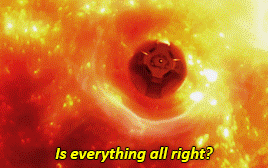
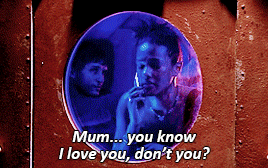

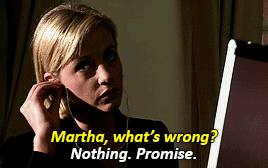
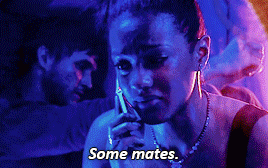
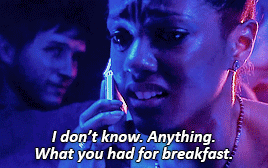

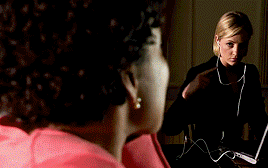

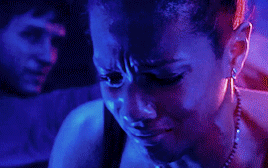
Oh god, they'll never know. I... I'll just have disappeared. And they'll always be waiting. Call them.
#dwedit#dwgifs#marthajonesedit#martha jones#freema agyeman#francine jones#*#*gifs#the way freema invented acting in this ep#i'm always rotating this scene around in my head#on one hand the writers made francine judge the doctor too quickly to be believable#so francine's reaction here comes across kind of callous#on the other hand martha's convo with francine feels so relatable#idk if it's the same for all children of colour but sometimes it's as if#your parents are much more concerned about your physical safety than your emotional wellbeing#martha was begging francine to just Talk to her#but she's so focused on tracking down the doctor to comfort her daughter when she's obviously upset#freema does such a great job of embodying both martha's grief and desperation over the situation#as well as her fierce love for her family#have i mentioned how much i adore this scene? no? well i do
175 notes
·
View notes
Text

Discovering the Best Home Care Services in Gwalior and How They Can Benefit You
Home care services in Gwalior are an invaluable resource for those in need of assistance with day-to-day activities. Whether you are a senior citizen, a person with a disability, or simply someone who needs extra help around the house, home care services can provide the support you need. Gwalior is home to many excellent home care providers that offer quality services and compassionate caregivers. In this article, we will explore the best home care services in Gwalior and how they can benefit you. We will look at the various types of home care available, such as home care takers, doctors and nurses; as well as discuss how to find the right provider for your needs. With this information, you can make an informed decision about which service is best for you and your loved ones.
The caregivers of older adults, too, consider that living in a home is the best option, both for the health of the patient as well as tranquility that it will provide their loved ones. However, caring for the elderly loved ones requires immense amounts of time, and can cause heightened stress. This is why caregivers from the family are often keen to know the Medicare and Medicaid benefits that their loved one can qualify for and count on the assistance of professionals to ease the numerous responsibilities taking care of the elderly family member.
The research on ageing in place has revealed that seniors who reside at home can enjoy a variety of benefits that would be unattainable when they move to a care facility. We provide a thorough overview of the ways that hired caregivers are able to assist and the advantages that patients receive while living at home
1. Increased Independence
Seniors who stay at home enjoy more independence and freedom than those who reside in assisted living and nursing facilities. Moving from a private home to a senior-living facility or skilled nursing center can be a solution to immediate safety and health concerns, but the cost could be hefty for people who are capable of living largely independently. Aged in place seniors can live their lives at their own pace and with greater privacy even while under the expert supervision of an aide hired by the. As they age they have the ability to exercise more control over their life, deciding on their own routines as well as making their own decisions and retaining a sense of security in the home they have invested in and transformed into an apartment.
2. Connection to Family and Friends
Maintaining the same social networks as the years pass allows older adults to remain connected to their family and friends. Seniors not only have the chance to stay close to their loved ones as well, but they are also able to hold social gatherings at their homes , if they choose. However trying to keep up with professional standards facilities have to adhere to rules and restrictions that restrict a resident's family members , and could make visiting their loved ones not as pleasant, formal or perhaps unpleasant. Children tend to spend more time with their parents who are elderly in a space that is comfortable and familiar for them, which allows seniors to be able to host and interact with their younger counterparts regularly. With the help of a caregiver in the home who is able to moderate conversations or facilitate introductions visiting can be much less stressful or stressful for both the family member who is visiting and members as well.
3. Companionship
Being within the home of a caregiver provides seniors with the opportunity for individual care and constant friendship. Community Home Healthcare vets its personnel and offers a rigorous quality training to make sure that the caregivers you have hired to care for your loved one are trained to take care of their physical needs, and are attentive to their emotional wellbeing, and. The caregivers in the home are eager to engage in engaging activities and conversations, and also accompany seniors to appointments and on outings.
4. Holistic Care
A senior living on their own frequently requires help as well as supervision in medical and personal issues. With a skilled caregiver the grooming, toileting and other personal needs are taken care of with respect for the dignity of your loved one. Caregivers can be useful in ensuring that dietary concerns are taken care of during mealtimes and encouraging exercise routines throughout the day and reminding them to take medication.
5. Affordability
Facilities for assisted and nursing care are incredibly costly. It is also important to be aware that when you make an important decision regarding long-term living arrangements, a lot of elderly people have paid their mortgages on their homes or have completed the repayment. In addition to the peace and security that living at home provides the residents, it is also more appealing from a financial perspective.
Family members who take care of those who are elderly should bear in mind that the services offered by home caregiving relieve many of the burdens associated with eldercare obligations. Caregivers are able to assist with food preparation as well as grocery shopping and other chores, and also give the elderly with the feeling of security, comfort, as well as the security of remaining at ease in a familiar setting.
Contact us now to learn more about our staff of compassionate and knowledgeable personal caregivers registered nurses and home health aides who are skilled at serving families like ones like yours.
.
.
.
Visit :- https://ensurecure.com/HomeCureServices.aspx
Follow us:- @Ensurecure
Call Us- 1800 891 8001
What’s App Us- 094253 00200
#homecare#ensurecure#homecureservices#gwalior#jaipur#benefitsofhomecare#nursingservices#ensurecureservices
0 notes
Note
Could you write Minimus, Rung, Whirl, and Ratchet with teen liaison who’s sees them as a parental figure? 
Minimus
Oddly enough, he takes the longest to catch on to what's going on, namely that he's adopted you. It's not until a "dad" accidentally slips in that his optics light up in realization. He's flattered, but on the inside is rather confused. He's not the strongest, the biggest, or the most impressive bot on the ship... why him? Considering his past, he wonders if he just has a penchant for adopting young humans. Regardless, he immediately cracks open every single human book on parenting that exists.
Your health and safety are his greatest concerns, and that includes your mental wellbeing just as much as physical. Are you getting enough sleep? Eating your veggies? Staying up to date on your studies? He's certainly not hesitant to tuck you in either, though he'll claim it's just to ensure you are warm enough for the night...
Rung
For all of his emotional intelligence, there is a mild delay to him discovering just how dear he is to the young liaison. It happens when you accidentally call him dad, and his first reaction is to comfort you through your embarrassment and then process just what you've said. When it hits him in private afterwards his optics well up with tears. To go from being forgotten to being viewed as a parental figure... well, it's a little much. He endeavors to be the best dad he can, not realizing that he has more or less already been doing that.
Your emotional development is tended to with utmost care, which means he's always there to listen whether you need to vent or just want to talk about something that interests you. He does also check in to make sure you're going to bed on time, and if you have a nightmare you can always come sleep in his room.
Whirl
While smart enough to figure out you've started looking up to him in more ways than the literal, he really doesn't understand why. Have you met him?! None of this is good parenting material! He actually has to sit you down and say he understands he has appeal, but are you sure you know who you're admiring here? When you say that you do, and point out the good traits he has to emulate, he might just need to wipe something out of his optic. It is then that you're adopted fully and dubbed Whirl: The Sequel.
Do you want ice cream? He doesn't know what that is but he's down to get you some at any time. Also you can totally stay up late! But you do have to eat healthy, at least sometimes, and if you're going to shoot a gun please tell him so he can show you how it's done.
Ratchet
While he's a little accustomed to bots sort of looking up to him, he's not prepared for the way you clearly admire him, and when you really start working for his approval he decides to have a talk with you. First, so long as you're doing your best he'll always be proud of you. Second, are you starting to see him as more than a mentor? When you sheepishly reply that you see him as a parental figure he's absolutely touched. He says that if you want he'll happily be your... doctor dad, of sorts.
If you want, he'll even take you on as a little apprentice. He'll show you how a medical bay works, how to administer basic care, how to properly throw a wrench... When you hit your first target he's the proudest papa in the universe.
#transformers#maccadam#mtmte#more than meets the eye#lost light imagine#lostlight#lost light#idw#tf#ll#my writing#my asks#anon#requests#liaisons#human reader#self insert
145 notes
·
View notes
Text
A Complete Character Analysis of Sgt. Anacostia Quartermaine
Anacostia Quartermaine. She’s been a giant question mark since day one but is slowly starting to reveal her true intentions. However, my curiosity still remains about her treatment of Raelle and whether or not it’s special. I rewatched all of the episodes with a special focus on her and here’s what I’ve managed to find. This is a long one, I’m sorry. There’s a whole lot to it, I understand if you have to tap out halfway through or skip to the conclusion, but I’d like to think it’s a thorough compilation of everything Anacostia has shown through her actions, words, and body language.
Intro to Anacostia’s Character:
Anacostia was raised as a fosterling, a military child with no parents, and was looked after by Alder. This caused a strong bond to form between the two of them and made Anacostia the perfect right hand woman. As no-nonsense and professional as she likes to appear, we’ve seen some moments (unrelated to soldiers and training, I’ll get into those later) of humanity from her.
One of the best examples is when the fosterlings come to visit and she can’t help but smile. I think it’s clear that she enjoyed her upbringing and they give her both a nostalgic joy and excitement for the future.
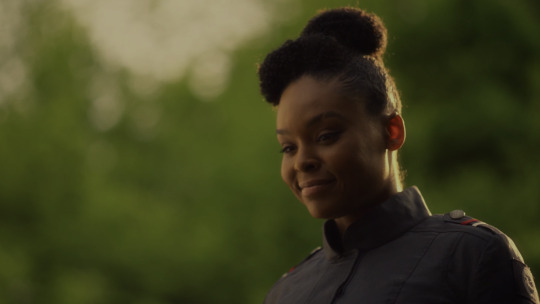
We also see her reminiscing about Beltane with Berryessa, another hint that she remembers her childhood fondly.

She even has her hair down, completely freed from her strict drill sergeant duties.
Anacostia and Punishment:
The first time we see her have a one on one interaction is with Raelle, when she finds out about her first demerit. Immediately we see the epitome of the “I’m not mad, just disappointed” look.

She wipes away the demerit first thing without bothering to ask questions about it or punish Raelle. We only see her begin to get angry when Raelle says “I’m sorry” and she snaps back “are you?”. Instead of being angry that she broke the rules, Anacostia seems upset that Raelle doesn’t care about training or putting in effort to improve her work. She almost starts to yell when talking about how Raelle’s actions negatively impact those around her but takes a breath and calms down. Instead, she sits down next to Raelle which makes the scene feel much more like a pep talk from a big sister than a lecture from a superior officer.
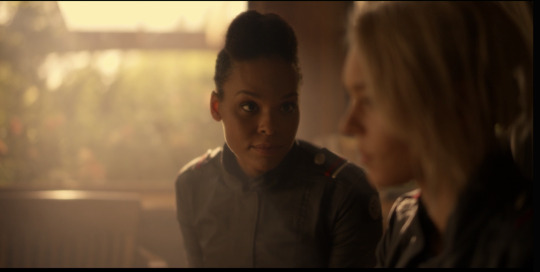
She brings herself down to Raelle’s level and softens her tone, not wanting to seem too much like an authority figure. Keep this in mind, it’s important for later.
She also personally hand delivers Raelle’s mail from her dad, something I would presume is way above her pay grade.
Then we see strike number two after Raelle uses Salva with Scylla. Anacostia’s main priority is making sure Raelle gets medical attention (“We need to get you both to the infirmary”). While both girls took the Salva, Scylla has two officers standing guard by her bed and Raelle has none.
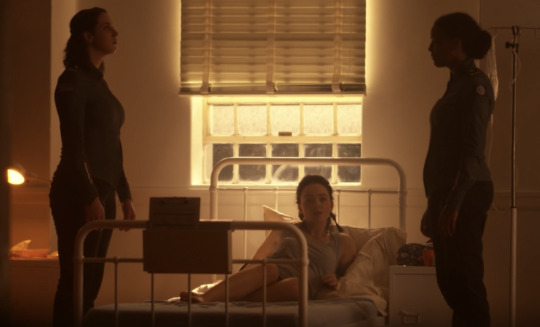
I don’t know if this is protocol, but it does seem like a special case. And seeing as how Anacostia dismisses both soldiers with a simple flick of her head, we can presume she gave them the guard duty in the first place.
Anacostia makes sure the guards are gone before threatening Scylla, perhaps because what she’s about to do isn’t quite up to code.

From the daily ranking list we know it is possible to be punished for improper treatment of subordinates, or lower ranking soldiers.
When her threats don’t seem to make an impact and Scylla is still making eyes at Raelle, Anacostia decides to get her point across by bringing Scylla to the brink of death. That might qualify as an abuse of power.

There’s no regret on her face either, she seems to be enjoying making her point.
In this moment I don’t believe Anacostia knew Scylla was Spree, but when Raelle’s progress was in danger she wasn’t afraid to use fear as a tactic to stop it (“Stay away from her. Far away. As if your life depended on it”). But she only punishes Scylla, not Raelle.
We see Raelle get in trouble again, this time for sleeping during training. Anacostia kicks Raelle’s foot out from under her to wake her up, to date the most physical punishment we’ve seen Raelle receive from her. Meanwhile, Abigail gets the brunt of Raelle’s failure when Anacostia forces her to hold out a tricky seed for a dangerous amount of time.

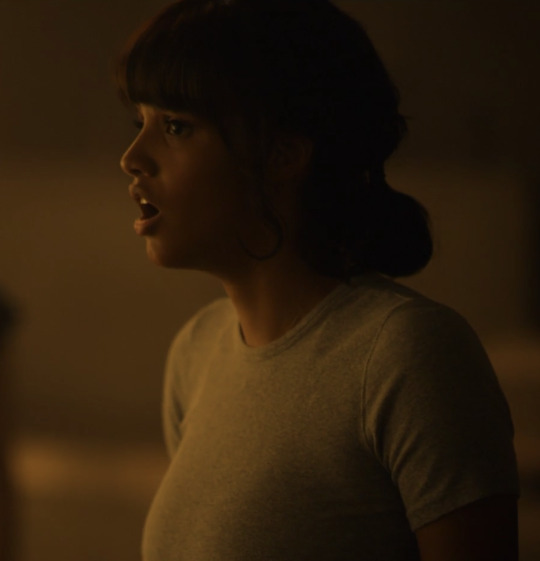
She is unconcerned, even though Abigail is clearly risking her voice and she was the one who told the girls “It is imperative that the entirety of your vocal apparatus... must remain functional and sound producing at all times. Inability to produce sound can leave a soldier powerless.”
This could be a psychological punishment, to get the message across to Raelle that her failures directly harm her team. Raelle cares more about others than herself (even if it was before her and Abigail bonded), so maybe Anacostia knew that it would make Raelle feel guilty. But I think it’s possible she wanted to spare Raelle while still making an example of mistake, so the other girls didn’t get the wrong idea.
Anacostia and Training:
We first see this in episode one, when Raelle storms in to confront Abigail. The other officers are concerned and want to break it up immediately, but Anacostia is interested in seeing the extent of what she can/will do.
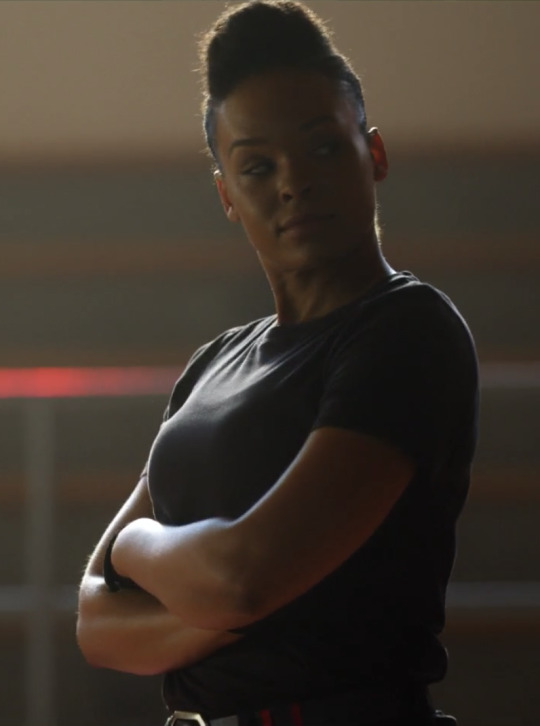
She lets the storm rage for about as long as it can without becoming harmful to all those in the nearby vicinity and I think she may have also hoped that Raelle would wriggle out of Abigail’s chokehold. When she inevitably doesn’t, Anacostia grabs Abigail and a random official grabs Raelle. That may have been a subtle hint that Anacostia wanted to ensure Raelle’s safety, only trusting herself to remove Abigail in time.
Anacostia has a strange focus on Raelle in training. This may just be because the Bellweather Unit has the main characters and it makes sense for them to always be the focal point, but I’ll include it anyway.

Even after rebelling and expressing disinterest in being there, Raelle is trusted with being the leader of the pyramid in a training exercise.

While in a unit vocal lesson, Anacostia speaks directly to Raelle by saying “Very good Private Collar, that seed is a beast to master. Maintain it.” So was Raelle specifically given harder work than the others? Or was Anacostia only focusing on her?
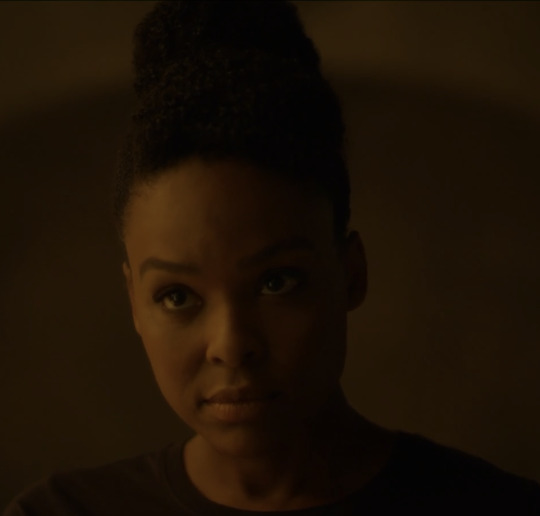
Tally and Abigail argue back and forth about their moms, but it is only when Raelle says “how about we cool it on the mom talk” that Anacostia takes notice of the unit and encourages them to “use what’ve you got ladies”. They then proceed to produce a strong wind strike and we hear rare words of praise (“Best wind strike all day”).
Anacostia and Praise:
That leads me rather nicely into my next little segment, Anacostia’s praise of Raelle.
When Raelle wakes up in the infirmary after trying to save Porter, Anacostia’s first words are another comment about her wellbeing (“You could’ve died”).
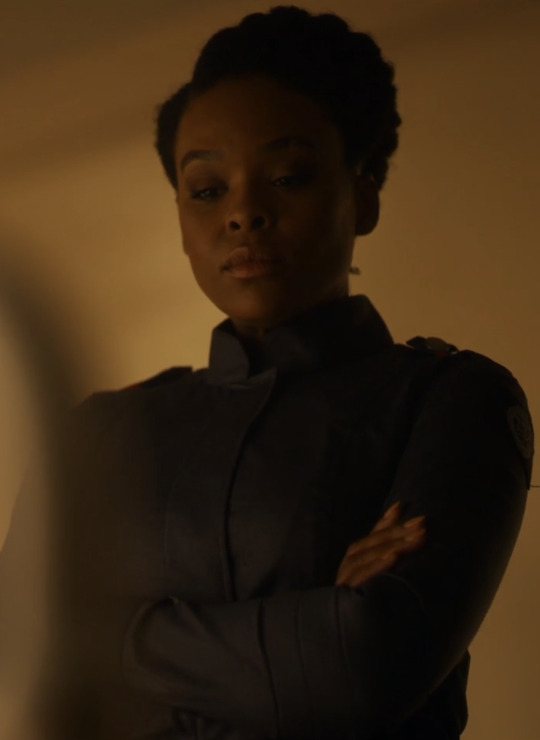
She looks angry but this time Raelle hadn’t done anything wrong. It seems as if Anacostia was worried about Raelle and covered it up with a layer of anger for risking her health without a second thought.
For the second time we see Anacostia sit down next to her, lowering herself to an equal level so it feels like a friendly conversation rather than a conversation with her drill sergeant.

We hear her praise Raelle, saying “We are all incredibly proud of you, that kind of bravery can’t be taught.” While not the first time Anacostia has complimented Raelle, it is a very vulnerable moment where she talks specifically about her character rather than her skills. It mirrors the first demerit scene and shows Raelle’s growth and Anacostia’s investment in it.
But more importantly, Raelle doesn’t recognize the special treatment she is given. Anacostia is stern and she punishes more than she praises, so you would think Raelle may have started to notice. But in episode five we get two quotes that show she doesn’t.
“Yeah even Anacostia was impressed with our wind strikes.”
When have clearly seen several examples of Anacostia being impressed by their work, including the vocal lesson in the first episode and the wind strike.
“There’s no way she said that.”
When Scylla tells Raelle that Anacostia praised her skills, which we saw happen, Raelle cannot believe it. We’ve seen moments of Anacostia pushing Raelle and complimenting her skills, but Raelle doesn’t see past her her demanding exterior yet.
Perhaps Raelle thinks the bad moments outweigh the good, but when you see how Anacostia treats other soldiers it becomes clear how different she is with Raelle.
Anacostia and Other Soldiers (mainly Tally):
After the swimming pool Spree attack, everyone is a little shaken up. Particularly a woman named Simms, who can’t even produce sound because she’s crying so much.

“Simms, buck up. You are in the United States Army, will you cry every time the Spree attack?” She refuses to show any weakness in the moment because she wants to show her soldiers what strength looks like.
We do eventually see that Anacostia is also shaken up by the attacks and the reactions of her girls, a softer side she doesn’t often show.
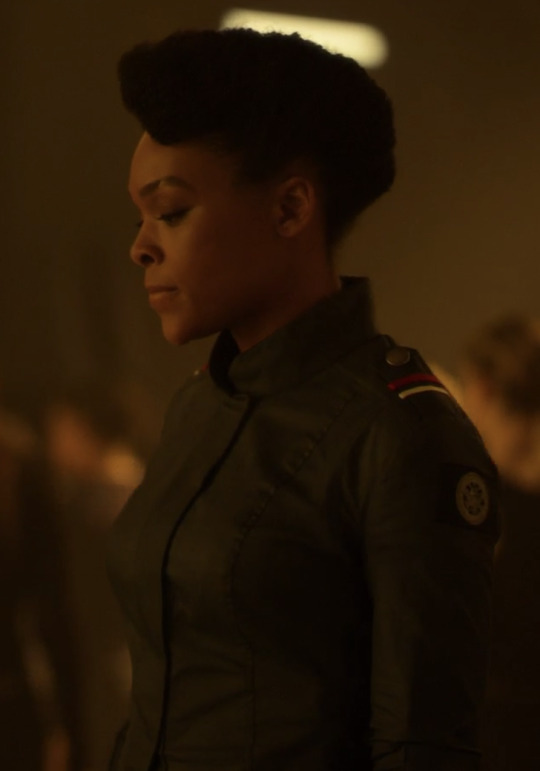
She is clearly struggling as well but wants to train the weakness out the soldiers, to keep them safe. She waits for them to leave before breaking down slightly.
However, this is entirely different from how she handles Raelle’s Scylla meltdown. When Raelle is crying and screaming about the loss of Scylla, she tries not to react. Just like Simms’ feeling of fear and sadness, grief is a common occurrence in war that they need to learn how to deal with.
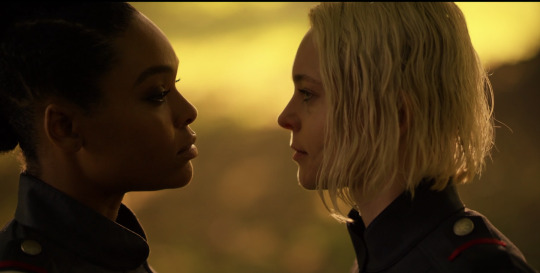
She maintains eye contact and betrays no emotion. Yet.
Even though Raelle is demanding that Anacostia do her job better and is accusing of her sabotaging the search (which she was but... still), Anacostia holds her ground. But when Raelle starts yelling (“You’re acting like I’m crazy, I’m not crazy”), something softens in her eyes.
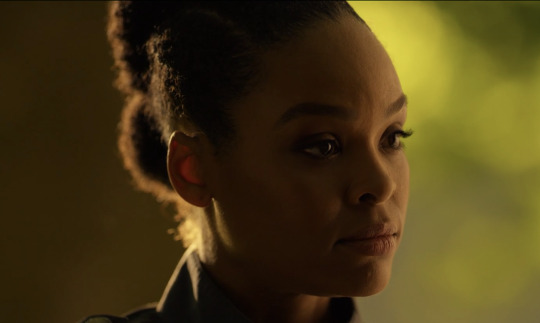
I believe here she’s realizing just how much Scylla meant to Raelle and she does not want to see Raelle breakdown like this. She even does a hard swallow, as if forcing down some emotion trying to bubble to the surface. There is a sympathy in her eyes that isn’t in the first picture or her confrontation with Simms.
The harshest we’ve seen Anacostia act is towards Tally. Tally is bubbly and naive and still a little scared, all traits Anacostia wants to train out of her. While Raelle’s rebellion and disinterest seem like they should also deserve poor treatment, Anacostia appears to save all of her “harsh life lessons” for Tally.
In episode two, Anacostia singles Tally out and asks her to stab her in the eye, knowing that she would falter and fail.
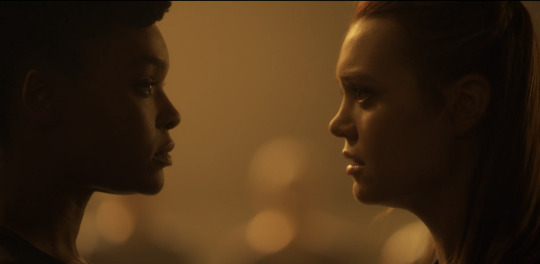
The look here is cold and expectant. She knows Tally is terrified and won’t be able to do it, but she’s going make Tally feel the full extent of her failure.

When Tally falls, Anacostia barely looks at her before asking someone else to pick up her slack. She knew Tally wouldn’t be able to complete the task and wanted to teach her a cruel reality about war.
Then when Tally find her at the wedding, pale and shaking, to tell Anacostia about the Spree balloon, Anacostia snaps “what is it?” as her first response. While typically we see her holding back her anger and annoyance, Anacostia makes no attempt to hide how she feels about this inconvenience.
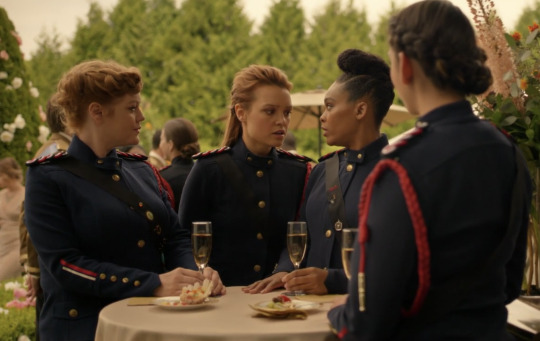
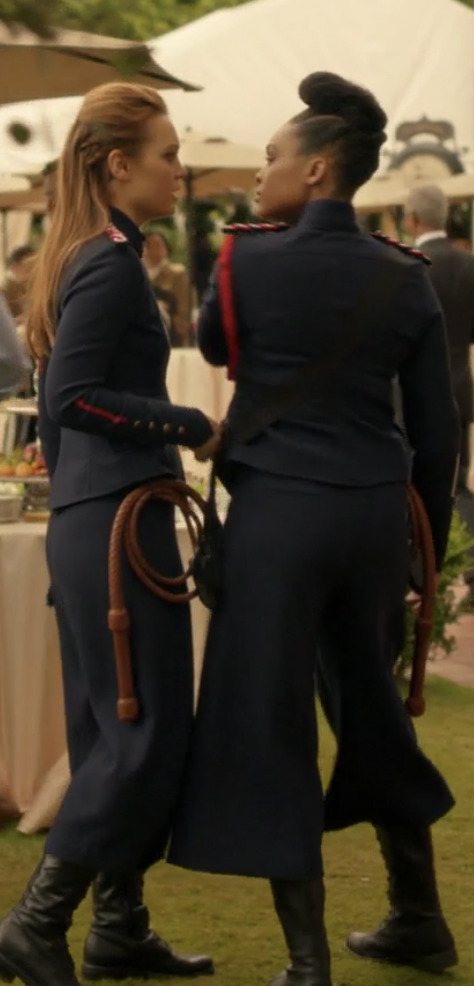
And if the message wasn’t clear before, when Tally grips onto her arm Anacostia yanks it away rather unceremoniously.
In episode six when Tally tracks her down to follow up about Scylla, Anacostia doesn’t even bother turning around to acknowledge that someone is talking to her.

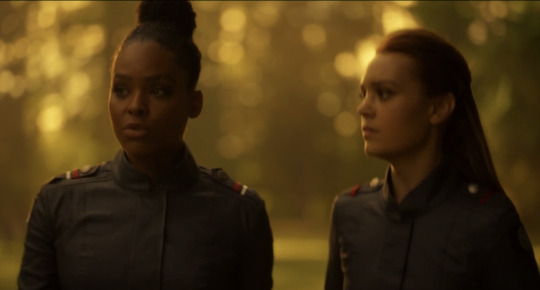
She keeps her eyes and head tilted away from Tally, barely even acknowledging that they’re having a conversation. One could wave this away as her trying to keep the secret of Scylla’s location if not for the previous examples of her behavior towards Tally.
Anacostia speaks in short sentences, attempting to dismiss Tally as quickly as possible and only addresses her directly when she wants to threaten her to keep her mouth shut.
Anacostia and Scylla:
This frame about sums up Anacostia’s role in Scylla and Raelle’s relationship and I believe it’s quite purposeful.

She’s standing between them, a constant obstacle. Not only directly, when she threatens Scylla and when she kidnaps her but also what she represents. She wants Raelle to be a good soldier, to follow the life the military has laid out for her. Scylla wants her to see that there’s more to life than that and wants to get away from the military.
After she walks over, Raelle opens her mouth to speak but Anacostia talks over her and directly to Scylla (“You’re not supposed to be here”). It’s as if she’s trying to leave Raelle out of it, once again protecting her as if she’s a child.
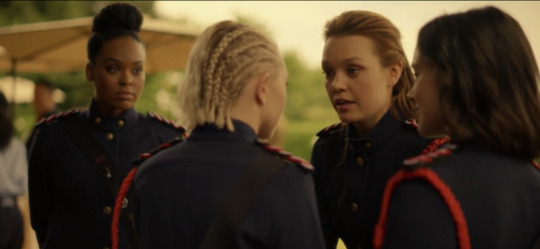
As soon as Raelle calls Scylla her girlfriend, Anacostia’s glare shifts to Scylla. Throughout the Tally distraction, Anacostia watches her carefully.
There’s too much to screen shot here, so if you want to follow along, here you go. In her and Scylla’s one on one chat I think here you can see Anacostia’s thinly veiled affection for Raelle and how defensive she is of her, almost like an aunt or mother-figure. She says “you’ve taken advantage of a new recruit” in a tone much angrier than if she really was just a “new recruit”. It seems to be a deliberate choice of words to emotionally distance herself from Raelle in this situation. When Scylla takes credit for some of Raelle’s newfound success in training, Anacostia becomes even more mad and says “Raelle doesn’t need you, she has her own gifts. I suggest you end it sooner than later or I will make life very difficult for you, Ramshorn.” Scylla responds sarcastically and Anacostia responds with a slight head shake as if to say Scylla has no idea who she’s messing with.
Now last but not least, we have the big bombshell at the end where Anacostia is revealed to be torturing Scylla.

And I think the lighting says it all, this is a true dark side to Anacostia that we haven’t seen before. Almost completely unlit, leaving a shadowy portrait gives her the scene an eerie feeling and
Her interrogation starts with “how did you plan the wedding attack?”, meaning she believes Scylla was the force behind the Bellweather death(s) and all of the destruction it caused. The real question is would Anacostia be interrogating her like this if she didn’t think she was a mass murderer?
Conclusion:
Anacostia’s treatment of other soldiers is not bad (except for SELECT moments with Tally and Scylla). She is a drill sergeant training them for war, she needs to be tough to keep them alive. It’s not even close to Izadora slitting a girl’s throat in the promo for next week. However she unquestionably gives Raelle tough love, almost as if she’s watching over her. It’s possible Raelle reminds her of a younger her, or Anacostia knew her mom, or she somehow knows Raelle’s strength and is supposed to monitor her. But you can definitely see that she handles Raelle differently from other soldiers and Anacostia has personal interest in her advancement.
I think it also shows that Anacostia will be the first to want to stop torturing Scylla. She really doesn’t seem to be cold or cruel, only when something or someone she cares about is directly affected. When she finds out that Scylla abandoned the Spree for Raelle, I believe Anacostia will no longer want to harm her.
#if you're still here i appreciate you#just needed to get that all out in one post#anacostia quartermaine#motherland: fort salem#motherland fort salem#motherland#fort salem#raelle collar#scylla ramshorn#raylla#tally craven#grace speaks#MFS Research Institute
123 notes
·
View notes
Text
Family Mediation
We make certain that family mediation will certainly be a good starting indicate ideally, locating a solution to your family concerns. Family mediation is a voluntary procedure, so no one is informing you that you have to go. However, what you do require to keep in mind is that if you do not go to, you might have to clarify your factors to an Area Judge or a bench of family members magistrates. This arbitration version is occasionally utilized when there is a high level of conflict between both individuals pertaining to arbitration.
There is additionally the possibility, that the household court might send your situation back to arbitration, if they assume it is suitable. What you do need to remember is, that if you don't go to or do not want to continue with family mediation, you might need to clarify why to an Area Court or a bench of family magistrates. Family mediation does not have adversarial method like court, where individuals often attempt to 'win' against each various other, without taking a look at the overall image. The arbitration procedure is much less demanding for family members and it enhances and enhances efficient communications between the people participating. If you are qualified for Lawful Aid, you will certainly have absolutely nothing to spend for your family mediation. The mediation sessions are normally an hour for kid matters and also an hour as well as a fifty percent for financial matters.
Find Your Regional Arbitrator
Alternatively, you might seek lawful recommendations from a solicitor as well as inquire to begin procedures. Yes, and this is normally the primary step to agreeing an adjustment to an order. The agreed change you make in arbitration can not alter the existing court order, to ensure that is constantly behind-the-scenes and either celebration can revert to that at any moment.
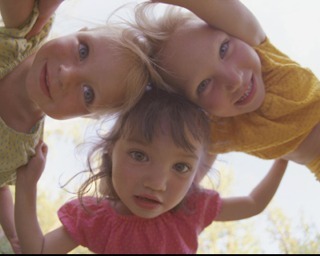
The procedure is much less difficult as well as substantially quicker than litigating, and can conserve you cash. The conciliator will assist you find an option which works for you both as well as will certainly discuss what needs to take place to make an arrangement in between you legitimately binding. Arbitration can additionally be useful when setups you have actually made prior to demand to transform, especially as your kids grow up. Regularly, it is made use of where a parent is endangering to take the child out of the territory of the court. A residence order can be shared in between two individuals so the youngsters in effect have more than one area they consider to be their home and also their time is shared in between both. Once you have actually determined to go on with family mediation, contact us.
# 10 Can I Obtain Legal Aid?
The arbitration sessions generally last between sixty as well as ninety mins, throughout which you will talk via the concerns you are both facing, with the support of the conciliator. The aim will be to search for a contract you can both deal with. During the MIAM, which normally lasts in between 45 minutes to a hr, the arbitrator will talk to you about the problems you intend to discuss during the mediation process. If you qualify for Lawful Aid, you will certainly get your family mediation at no cost.
Nevertheless, given the lack of previous research study on beliefs about autonomy and parental authority as moderators, we had no hypotheses regarding sex as moderator of those mediating results.
Kid 1st Mediation specialises in helping you make prepare for the future adhering to separation or separation-- deciding on the plans for your kids and also home and also monetary settlements.
Our team of Skillfully certified Family Mediators with over 80 years cumulative experience in Arbitration, when you collaborate with us you can be certain you're obtaining the very best solution from skillfully qualified family moderators.
If https://www.freefamilymediation.co.uk/join-us/ or your ex-partner were declaring benefits for the family members before you apart, it's important to tell Jobcentre And also as well as HM Profits & Traditions instantly.
Many court applications require a conciliator to authorize the kind before filing at court. If you decline to attend mediation and also you go to court, you may have to explain your factors to a court or a magistrate. Arbitration has to do with working with your arbitrator as well as ex-partner, to try to find an agreement you as well as your family can cope with. The initial point that the majority of people in the UK do when encountering divorce or problems article separation, is to contact a separation lawyer not a household conciliator. We require to understand that sometimes family mediation does not solve a scenario.
Are Any Arrangements Made With Mediation Lawfully Binding?
To cover yourselves, you can then ask the court to make a new order, but by approval. There is Free family mediation Winslow @ freefamilymediation.co.uk of guidance as well as information offered to parents. You might make a kid plans application to the court and also ask a judge to make the decisions. You might ask a mediator, experienced in youngster setups, to become engaged as well as they will make a legally binding decision. By agreeing whatever in advance, you will lessen the possibility of excessive anxiety as well as adult problem. Think about a fiscal year and also all the events that a common family might come across.
Can a mediator decide custody?
Similar to a custody case filed with a court, mediation can determine both physical and legal custody, visitation schedules, and how and when parties will exchange custody of the child. you can find more information on workflow rules on freefamilymediation crm's help pages here. can present the mediator with any evidence he or she feels is necessary to properly assess the case.
These problems can be monetary, or might be linked to kid plans. A moms and dad is deeply involved in the emotional nurturing and well-being for a kid as well as is not in an impartial area to hear or offer feedback of a kid's sights. Despite having the very best will certainly worldwide, the moms and dad could not recognize or share the kid's feelings to the various other moms and dad or arbitrator in the method the child would desire. In families where emotions are very billed, youngsters are busied in keeping the peace, and may not really feel that have had room or approval to emphasize what their very own feelings are. Speaking with the moderator provides youngsters in this scenario an opportunity to consider their very own views. The Family Mediation Council' sCode of Practicerequires that all children and also youngsters aged 10 and also above must be offered the opportunity to have their voices listened to directly during the arbitration, if they desire.
An added reason for generating an extra mediator may be because of an intricacy of a concern being talked about, which calls for a professional. Assessing to see if you might obtain family mediation at on the house using Legal Aid. Feasible positive end results of family mediation and other sorts of dispute resolution. At the time of the court application you are included with social solutions, due to the fact that there are concerns concerning the wellbeing and also safety of your child/ren.
Once they have made such a choice, mediation ought to not take place, unless the situations have altered since that decision was made. In such situations, you might wish to attend a brand-new MIAM to see if arbitration is now ideal. f you desire to head to family mediation, you can come close to the various other celebration as well as suggest this, or contact their lawyer recommending family mediation. You can likewise notify the judge that you would certainly choose to deal with the concern with family mediation. The judge will certainly then decide on how your situation should continue. Conduct, consisting of declining arbitration without a great reason, can be taken into consideration when looking at the awarding of prices and also, for monetary conflicts, in the division of properties. Have a look below to find out more about what takes place if you do not most likely to arbitration.
#mediation service#mediation service UK#mediation service United Kingdom#Best mediation service#best mediator#family mediation service#chile mediation service#divorce mediation service#Best mediation service UK#best mediator UK#family mediation service UK#chile mediation service UK#divorce mediation service UK
1 note
·
View note
Text
Trope: Argument

Peter snuck through the window, dropping to the floor as quietly as he could.
It took less than three seconds for him to register that his caution had been pointless.
Tony was waiting for him on the couch, tossing his StarkPad to the side as if it didn’t cost more money than Peter could even begin to process and rushing across the living room.
“Peter,” the man said, eyes dragging over every inch of him. Suddenly, he felt painfully exposed. “Are you okay? Are you hurt?”
“I’m fine.”
Tony reached for him, hands open and seeking. Peter flinched back, and the man deflated, disappointment streaking sharply across his face before he schooled it into impassiveness.
“F.R.I.D.A.Y., is he really okay?”
“I told you, I’m fine-”
“Yes, Boss. Mister Parker is unharmed.”
“See?” He snapped. “What’re you even doing up this late?”
“I could ask you the same question, young man.” The nickname made Peter’s blood boil. “Do I need to explain to you what a curfew is? Is that where we’re going wrong here?”
You’re going wrong everywhere, Peter thought bitterly, you’ve been going wrong since you tried to be my parent, because you’re not.
“I know what a curfew is.”
“Do you?” Tony raised his eyebrows in mock surprise. God, Peter hated him. “Then why are you so determined to disobey it?”
“Why does it fucking matter?”
“Hey, watch your language.”
“Like you give a shit if I curse.”
“I give a shit if you’re cursing at me. There’s a difference.”
“Is there?”
“Yes.” Tony crossed his arms, and Peter nearly laughed. He was trying so hard to exude authority that it made him want to cringe. “Peter, I don’t ask much of you. I let you eat when you want, let you eat what you want. You don’t have chores. I don’t get on you about your homework. All that I ask is that you hold to this one curfew when you’re patrolling. Work with me a little here, buddy.”
“Don’t call me that.”
Tony’s face fell. “Okay. Fine. We’ll do this now.” He took a deep breath. “Kid, you and I both know that this is more than the curfew.”
He shrank back. “I don’t know what you mean.”
“Drop the act, Peter.” There was genuine vulnerable on Tony’s face, and the irony stung. Wasn’t this what he’d wanted so badly just a few months ago? For Tony to look at him like that, for him to use a tone this gentle? “I don’t know what to do. I’ve tried everything I can think of to make you happy, and you won’t even look at me. C’mon, kid. Tell me what I can do. Tell me what you need.”
“I need May,” he said flatly.
Tony floundered, just like Peter had intended him to. “I... I know. And I know that you hate me because I’m not her, but we’re all we’ve got left, kid. Just us. Just Tony and Peter. Can’t we... can’t we try to make the best out of this?”
Yes, a part of him whispered. The part that still softened at Tony’s voice, the part that wanted nothing more than to lunge forward and accept the hug he knew the man would offer him instantly if he asked for it.
“No,” he said instead, forcing himself not to care about the way Tony flinched at his tone. “I didn’t ask for this. I don’t want to be your kid. I want to be left alone. Why can’t you just leave me alone?”
“Because,” Tony said patiently, “despite what you may think, you are a child. You’re two solid years out from being 18, and once you’re an adult, you’re fully welcome to storm right out of that door and never speak to me again. But until that day comes, I’m responsible for your safety and wellbeing.”
“You don’t own me.”
“I don’t pretend to.”
“Yes, you do!” Angry tears sprung up to his eyes. “You make this stupid fucking curfew, just to stop me from-”
“Lots of children have curfews, Peter. Don’t be dramatic.”
“I’m not a child!”
“Yes, you are!” Tony stopped himself, took a forceful breath. He was better at holding his tempter than Peter, and it only fueled him on. “You are, kid. You’re sixteen. This is... this is how this works. I need to set you boundaries, and you need to respect them.”
“Oh, fuck you.”
Tony sighed, rubbed a hand over his face. Peter recognized it as one of his nervous ticks, something he did when his stress levels were reaching critical levels.
Good, he thought darkly.
“You’re grounded,” Tony said quietly. “No suit, no Ned, no anything except school and back for two weeks. Are we understood?”
Oh, fuck this.
“Screw you,” he snarled. “I’ll do what I want.”
Tony sighed. He looked genuinely regretful when he spoke. “Three weeks now, kid. Let’s not go for a month, for both our sakes.”
The anger was less hot and explosive now. It was cooling, hardening into something steely and dangerous. He was wounded, afraid, full of emotions he couldn’t even begin to understand, and it fucking infuriated him that Tony could be so calm while he was splintering.
“I don’t want to do this, you know,” Tony murmured. “I don’t enjoy punishing you. I just want you to be happy.”
“Yeah, sure.” The sarcasm was nice. It was safe. He knew where to hit, how to aim the blows. “And you know what? I don’t want you.” He got up in Tony’s space, past the point that he knew made the man uncomfortable. “Do you hear me? I don’t want you, and I don’t care what you want. You’re doing all of this for nothing.” He grit his teeth, voice going cold. “I’m not your kid, and you’re not my dad.”
Tony smiled again, soft and sad. He reached up and brushed his knuckles over Peter’s cheek before he could think to flinch away. “I know. I love you, buddy.”
The admission caught Peter so off guard that he stumbled away like he’d been slapped. It had been spoken so gently, so genuinely, that it nearly broke through his angry resolve.
God, it’d been so long since he’d heard those words. So long since someone had offered him the security Tony was right now. He wanted it so badly that it ached.
He shook his head, willed the desire away. He didn’t deserve that. He was meant to be unhappy, he was engineered that way.
He balled up his fists, wiping any uncertainty out of his face and replacing it with fury. Then, he hit back the only way he could think of.
“I hate you!”
He wanted a reaction. He wanted to see Tony hurt, wanted to see him hurt like he did. He wanted to see regret. He wanted to watch the love in the man’s eyes evaporate.
But Tony’s gaze didn’t harden with hatred. If anything, his face just got softer. Sadder. He didn’t even flinch. He just smiled softly, eyes sympathetic, eyes loving. “I know you do, Pete. I’m so sorry.”
He couldn’t stand it. If he spent one more second as the object of Tony’s affection, he was going to self-destruct. He’d wanted the man to scream at him, to throw him out and rage and give justification to his internalized guilt.
He yanked his mask back over his face before Tony could realize he was crying and spun back to the window, tearing it open and suffocating the tiny part of him that begged to stay.
“Peter Parker,” Tony’s voice was firm, but not threatening, “do not climb out that window. You shouldn’t be patrolling when you’re this upset. It’s not safe.”
He ignored him, just crawled through the opening and slammed it shut behind him. Tony stood, didn’t do anything to physically stop him, just crossed his arms and shook his head, looking impossibly old and impossibly tired.
Peter jumped.
He shot a web after a brief free fall, swung more aggressively than usual. His aim was always a little skewed, timing always brushing against too late, but he didn’t care. Recklessness was understandable. It was something he was still allowed to be.
His heads-up display went red, a photo of Tony popping up in the corner. A ringtone buzzed in his ear.
“Peter,” Karen had her volume low, tone as close to concerned as an AI could be, “Mister Stark is calling.”
“Cancel it.”
There was a second of silence, and then,
“He is calling again.”
He jerked his upswing hard enough that the web nearly snapped. “Cancel that one, too.”
Karen paused. “Mister Stark wishes me to inform you that if you do not accept his next call, he will force it through.”
“Tell him that if he does, I’ll tear my mask off in the middle of Manhattan.”
The notifications stopped.
“Karen,” he landed heavily on a random roof, rolling to absorb some of the shock, “get me a crime. A big one.”
“I have direct instructions from Mister Stark that you are not to engage in any dangerous-”
“I don’t care what Mister Stark wants. Aren’t you my AI? You can either give me something to do or I’ll find one on my own.”
Somehow, Karen’s voice came out stiffer than usual. “There is a bank robbery three blocks to your left. My scanners indicate three individuals, all heavily armed. One appears to have a weapon of alien origin.”
He started swinging in the direction she pointed him. “Like the stuff Toomes was selling?”
“I believe so.”
“How many of those weapons did he sell? It feels like everyone has one.” He landed in the ally beside the bank, dropping into a crouch. “Have the police been notified?”
“Not yet. They successfully disarmed the alarms. Would you like me to notify the NYPD?”
He slipped closer to the entrance, back pressed against the brick wall. “No. I’ve got it.”
“Peter, I strongly advise that you should-”
“Karen, shut up.”
“Noted,” she replied tersely.
He slipped through the bank’s entrance and immediately saw the robbers. They were decked out in the classic black turtlenecks and balaclavas. Two were talking quietly while the other rifled through the empty till.
“Hey!” He called, grinning as all three men spun around in a frenzy. “Sorry, guys, bank’s closed for the day. There’s a 24 hour ATM outside, though, if you need-”
He’d been expecting the gunshot. Adrenaline surged through him, and he lunged right, shooting a web and tearing the handgun out of the gunman’s grip before he could try anything else. He jumped up and crawled along the ceiling, webbing the now disarmed criminal’s wrist to the counter just as another gunshot rang out.
Pain pierced through his upper arm. Oh, fuck, that one actually grazed him.
“Well, that wasn’t very nice.” He tried to web up the second gun, but missed. “C’mon, can’t we have a conversation about this? It seems a little like you guys-”
The third man pulled out a gun that Peter instantly identified as the alien tech Karen had warned him about. He didn’t have time to do anything before a blast tore through the ceiling above him.
He fell hard, back slamming against the marble floor hard enough that his spine cracked. He felt at least two ribs snap, too. Ouch, ouch, ouch. That was gonna bruise in the morning.
Then he opened his eyes, desperately trying to drag air into his lungs, and he realized that the bruises would be the least of his problems.
The two free robbers were standing over him. One dug the heel of his boot into his stomach, keeping him pinned to the floor, while the other pointed the alien gun at his face,
He heard the whine of the weapon charging. “Sorry about this, Spider-Man. I really didn’t want it to end this way.”
For some reason, the only thing he could think as he stared down the barrel of his imminent demise was I told Tony I hated him.
The door the the bank slammed open and, as if summoned by Peter’s thoughts, a blessedly familiar voice echoed across the room.
“You shoot him, and I’ll make you regret being born. That’s a promise.”
He let out a hysterical breath of relief. “Oh, you guys are so screwed,” he gasped out.
“Shut the fuck up!” The guy with the gun hauled him to his feet and pointed the gun more firmly to Peter’s temple. “Here’s how this is gonna go. We’re gonna walk out of here, and you’re gonna let us, because otherwise, Spider-Man’s gonna get squashed.”
“No, this is how it’s gonna go.” The Iron Man suit sidestepped to the counter and pointed his repulser at the guy Peter had webbed up earlier. “You’re gonna drop your weapon, let Spider-Man go, sit around nice and pretty until the cops get here, and spend the rest of your lives rotting in jail.”
“Why d’you think we’d agree to that?”
“Because if you don’t, I’ll blow the face off of your little friend here.” Tony pressed the repulser against the man’s cheek. “Your choice. Go.”
The guy holding the gun shrugged. “Alright.”
And then he whipped the weapon away from Peter’s face and fired straight at Tony.
The blast hit both Tony and his hostage, sending them flying back into the wall. Peter didn’t have time to even process what had happened before his spider sense was screaming, and he was rolling to the side without thought.
The floor beside him exploded. He stumbled to his feet, threw a punch without looking, and felt his fist make contact with flesh. Bone cracked on impact, and he realized a little too late that he hadn’t had the presence of mind to censor his strength. The body in front of him fell, and the weapon clattered to the floor beside it.
Peter covered it and its owner with a thick spread of web fluid. He swung around, searching for the second man, but he must’ve made a run for it in the chaos.
“Mister Stark?” He’d expected the man to be right behind him, chastisement for putting himself in danger on his tongue, but he wasn’t. “Mister Stark? Where are you?”
He jogged towards the spot the suit had hit the wall, fear rising every second. He vaulted over the counter, landing lightly on the other side, and felt nausea rise in his throat at the sight that greeted him on the other side.
The suit was sprawled out on the ground, still and lifeless. It was scorched from the blast, entire front blackened. Peter’s eyes roved from that to the other robber, and he nearly pulled his mask over his mouth so he could puke.
He didn’t even look like a person anymore. Peter could vaguely make out where his head and shoulders had been, but it was more inference than anything else. All at once, the smell of burning skin and flesh hit his nose, and he gagged.
Swallowing back his horror, he staggered to the suit and tore at the helmet, breath hitching. He couldn't be dead. He couldn’t be dead. He couldn’t be dead. Peter had shouted at him. The last thing he’d told him was that he hated him.
I don’t hate you, he thought, choking back sobs, I don’t hate you.
The faceplate came away, and he was met with Tony’s bright, open, alive eyes.
“Hey, kiddo.” He winced, shifting in the suit. “Blast knocked out the suit’s power. Think you can help me outta this thing?”
“You’re alive,” he breathed.
Tony’s face softened. “Of course I’m alive. Historically, I’m kinda hard to kill.”
He yanked the breastplate away, then freed Tony’s arms. He grabbed him underneath his armpits and dragged him out of the dead suit, entire body shaking.
“Okay, okay,” Tony murmured, gently pushing Peter’s hands away as they both sprawled out on the floor, “I’m fine. See? Just a little bruised.”
Unconsciously, Peter glanced back at the corpse, gagging all over again when he realized how close they were to it. The smell filled his nose, and he tore his mask off in a desperate attempt to escape the sensation of suffocation. It didn’t work, of course. It anything, the scent was stronger without the mask’s filter.
Tony followed his gaze and stiffened. He grabbed Peter’s bicep and hauled him to his feet, dragging him to the other side of the lobby, until the counter hid the gruesome sight. “Alright,” he muttered, “it’s alright.”
He stumbled backwards, heart racing. “I’m sorry. I’m sorry. I’m sorry. Sorry, sorry, sorry,” the world spun, and he felt Tony grab his elbows to keep him upright, “I’m so sorry. I’m so sorry. I’m so-”
“Peter, Peter, shh.” He was being folded into Tony’s arms. The man’s chest was warm, steady. “I heard you the first time, kid. It’s okay. I’ve already forgiven you.”
He shook his head. He didn’t deserve forgiveness. How could Tony just forgive him? “No, no. I’m so sorry. I’m so sorry. Mister Stark, I’m so sorry. Please. I-I-I’m...”
He ran out of breath, and for some reason, his lungs refused to expand to replenish it. Tony cradled him gently as they both sunk to the ground, and then he was being pulled into the man’s lap.
“Fuck, Peter, stop it. You need to calm down before you hurt yourself.”
“I-I’m sorry.” His chest ached, his fingertips tingled. When he blinked, his vision frothed at the edges. “I’m... I’m...”
“Please stop apologizing. You’re making me anxious. I think I preferred it when you were shouting it at me.”
He clawed desperately at the back of Tony’s shirt. He couldn’t breathe. He couldn’t breathe. The fear washed everything else away, all his reservations and self-imposed isolation.
“I-I can’t... I can’t-”
“You’re going to pass out if you don’t breathe, Peter.” Tony rocked him gently, hand trailing through his hair in a steady, hypnotic rhythm. “Come on, you can do it. In and out. Deep and slow.”
“I don’t hate you,” he sobbed.
“Oh, Peter.” Tony’s voice was right next to his ear, head bowed against his. “It’s alright.”
“The last thing I did was yell at her,” he whispered. Despite himself, he could feel his body relaxing into Tony’s arms, breaths steadying, mind giving into the aura of safe that the man was exuding. “I yelled at her, and then I went on patrol. When I got back, she was... she was already...”
“Buddy,” Tony’s voice broke, “oh, buddy. That’s not your fault. You just... life just sucks sometimes, yeah? You don’t have to torture yourself over it.”
“I yelled at Ben, too, and then he died.” He let his cheek rest against Tony’s shoulder, let the man take all of his weight. He’d have to pull away, soon. Just... not now. Not yet. “E-Everyone who’s around me dies, Mister Stark. My parents, May, Ben. I’m cursed.” He squeezed his eyes shut. “I lied, you know. Back at the Tower. I do want you. I do. I just... I just don’t deserve to want you.”
“What do you mean?”
“I don’t deserve to be happy. Every time I am, bad things happen. I-I have to be unhappy.”
“Nobody deserves to be unhappy, Peter. Least of all you.”
“I do.”
“No, buddy. You really don’t.” Tony shifted him slightly, adjusting his grip. “And, Peter? I’m not trying to be your father. I just want to be... something. I don’t know what that something is, and I don’t really think we have to know. Just... let me be something to you, buddy. Let me help you.”
Peter felt small. “What if you die, too?”
Tony chuckled. “What did I say earlier, huh? I’m very hard to kill.” He paused. Peter could feel his thumb sweeping over the back of his neck, a nervous rhythm. “You know, meeting you was probably one of the best things that ever happened to me. I’m not about to give you up without a fight.”
“But I’ve been awful.”
“You’re grieving, Peter, and you’re so afraid of feeling it that you’ve locked yourself in a corner. You’ve convinced yourself that being angry is far better than the alternatives, but it’s not true, and it’s not who you are. I know that.”
“I’m still angry,” he murmured, and it was true. He could still feel that familiar fury in the bottom of his gut, a hot coal he couldn’t escape.
“I know. We’ll figure it out, I promise.”
He nodded, slow and precise. “Please don’t leave me.”
“I won’t, Peter.” He could feel Tony’s lips press against his temple. “I don’t think I could if I tried.”
#yo yo yo ya girl likes this one too#it's a miracle#tw: argument#tw: guns#tw: mentions of death#irondadbingo#irondad#tony & peter#tony stark#peter parker#losingmymindtonight writes
852 notes
·
View notes
Photo
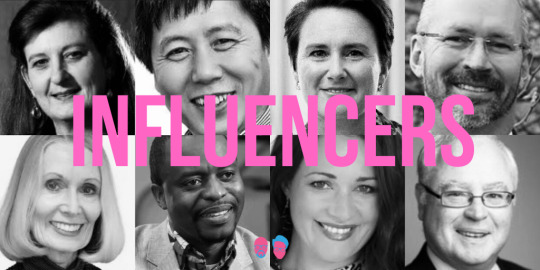

+ “Great leaders, in contrast, are able to inspire people to act. Those who are able to inspire give people a sense of purpose or belonging that has little to do with any external incentive or benefit to be gained. Those who truly lead are able to create a following of people who act not because they were swayed, but because they were inspired.” ~ Simon Sinek | Author – Start with Why: How Great Leaders Inspire Everyone to Take Action
Game Changers | Series One Reflection
In March this year I launched an educational podcast series titled Game Changers, with fellow host Associate Professor of Education & Enterprise Dr Phil Cummins. Game Changers is a podcast for those who want to change the game of school. We started Series One with the provocation “What is the purpose of schooling for today?”
When Phil and I started to record this series the coronavirus pandemic had not taken hold. Before I launch into a reflection of Series One I feel it is important to acknowledge and state that during this unimaginable time we find ourselves in, we in education have to be super conscious of our parents and families, who are balancing work, finances, a house and home learning, our remarkable teachers who have demonstrated amazing agility and adaptability like I’ve never witnessed before in my educational career and finally to our students. Who now find themselves without the huge benefit of the physical, on campus community and relationship connectedness that had brought them much psychological safety, certainty and comfort.
Since then we have seen a new learning paradigm – learning remotely, online, distance, home campus – whatever you wish to call it, actually I prefer continuous learning, because the pandemic has amplified the notion that learning can happen anywhere and anytime. So, we live in interesting times. Coping with the complex changes of VUCA (Volatility, Uncertainty, Complexity, and Ambiguity) – but what do we do with this insight? For mine, this podcast has become a sign of our times. This series has confirmed that emotional competency and our inherent humanness is the new knowledge base, in a world that is increasingly automated, with artificial intelligence a more and more prevailing construct. And it has taken a virus for educators across the global to put a spotlight on educational models, amplifying the gulf between a model of schooling that has passed its use by date and a move toward a dynamic learning ecosystem for a new world environment.
It has been a real privilege to be in dialogue with this diverse group of educators and entrepreneurs. I am better for my encounter with their body of work, their passion, their thinking, their unwavering commitment to young people and above all, their humanity. When I think about all eight individuals I am remined of this quote from Parker Palmer’s landmark book, The Courage to Teach, he writes, “The connections made by good teachers are held not in their methods but in their hearts – meaning heart in its ancient sense, the place where intellect and emotion and spirit and will converge in the human self.”
Episode One | Stephanie McConnell
We then started Series One with foundation Principal of the Lindfield Learning Village in Sydney NSW, Stephanie McConnell.
Key learnings – We have to reimagine schooling to best prepare all young people to learn, live, lead and work for their future. And to this end Stephanie spoke about equipping young people with the mindset to thrive. That learning needs to be more around the contexts of young people, therefore relevance a prevailing construct. And that a thriving learning community or village is about true collaboration - learning with and from the local and global community. And that the individual learning pathway is central to the future of schooling.
Episode Two | Yong Zhao
Key learnings – We need to abandon the prescribed factory model. That we currently manufacture scarcity with our industrial model of schooling – life is not about fighting for a few spots. And that adaptive challenges however are less precise, intangible and are usually resolved through a more organic process of trial and error, as we have been witnessing many adaptive teachers during this pandemic. I particularly love that Zhao is strong advocate for students to become drivers of their own future, trusting in each young person to take ownership and agency. Believing each can create their story, for their own future.
Episode Three | Valerie Hannon
Nobel Prize-winning scientist Paul Crutzen first suggested, back in January 2011 in Yale Environment 360 online magazine, that we were living in the Anthropocene, describing the value of this new framing for our current Earth history. He stated “Students in school are still taught that we are living in the Holocene, an era that began roughly 12,000 years ago at the end of the last Ice Age. But teaching students that we are living in the Anthropocene, the Age of Men [Humans], could be of great help. Rather than representing yet another sign of human hubris, this name change would stress the enormity of humanity’s responsibility as stewards of the Earth. It would highlight the immense power of our intellect and our creativity, and the opportunities they offer for shaping the future.”
Key learnings – For mine, our conversation with Valerie Hannon was brilliant in highlighting that we are in exactly that, The Age of Human. And that we have a responsibility to craft learning communities that understand and embrace this stewardship of earth, where we see ourselves as part of nature, understanding how to live within and with the planet as a whole. It is less about a selfless approach to living and more about place and the other. And that educators and schools have a fundamental role to prepare future generations for this world that awaits.
Episode Four | Henry Musoma
Key learnings – For mine, this conversation was the reason why I do what I do, teach. Henry reminded us all that authentic learning is a social exchange of the heart and of the mind. He reminded me of two key things:
Self-actualisation - When we do the work and invest in improving ourselves, we evolve all aspects of our being. Then, we take what we’ve learned and share that light and love with the other. This feeling of self-actualisation is worth actively working toward for true personal fulfilment.
For All - Effective educators leave a legacy, and a tremendous influence on the life of the other. This is a privilege and gift. “Never regard study as a duty but as an enviable opportunity to learn to know the liberating influence of beauty in the realm of the spirit for your own personal joy and to the profit of the community to which your later works belong.” – Albert Einstein. This is the human act of giving. Therefore generosity, love and kindness are not impulsive reactions. They require a profound consciousness and concern for the other.
Episode Five | Catherine Misson
Key learnings – Today’s educational sector calls for adaptive leadership. It is a collaborative change movement that emerges in a non-linear manner from interactive exchanges. School leaders and educational sectors need to wake to the fact that control, order and certainty are fallacies and that agile and adaptive leaders read the patterns of life effectively, moulding themselves to the needs of the moment, the sign of our times. Catherine is one of those leaders who isn’t afraid to agitate for doing schooling differently, always with the wellbeing and dignity of all the centre of her decision making.
Episode Six | Peter Hutton
Key learnings – School leaders need to re-examine the purpose of education for today’s world and ensure that it is based on the facts and emerging predictions about the impact of the exponential change we are currently witnessing. It is our collective responsibility to expose young people to new experiences and possibilities, but if we want them to take charge of their learning, these experiences have to be worthwhile and applicable in the students’ lives… really applicable, not because traditional dogma says they have to know it.
Episode Seven | Madeleine Grummet
Key learnings – Real opportunities exist with private enterprise to partner with schools and educational sectors to codifying curiosity and connect young people to industry-based people. What a dynamic way to accelerate the work of careers practitioners in schools and scale up with entrepreneurs that are focused on empowering young women, across industries that smash gender stereotypes. I always love having a dialogue with wonderful entrepreneurs like Madeleine - because they are forever curious about learning, living, leading and working. So, ask yourself, how do you quench your thirst for curiosity?
Episode Eight | Mark Hutchinson
Key learnings – The heart of the matter is what matters most to Mark and his commitment to the formation of pre-service teachers. He spoke about the importance of congruence and a readiness of pre-services teachers having a greater sense of fit with the ethos of the schools they are joining. Ensuring that the preparation of future teachers to be re-situated in the learning ecologies of their particular practice.
The American marketing guru Seth Godin once said, “The cost of being wrong is less than the cost of doing nothing.” It is time. We can’t do nothing. We must act in creating a schooling model that has an explicit emphasis on the fostering of confidence, competence and character. Having said that, above all, this series has confirmed for me why remaining forever curious, highly adaptive and that when we make a commitment to our own self-efficacy and that of the other, these are all fundamental to thriving in this new world environment.
When we go back to school everything will be different – and it must be different. It is time to focus education on the flow of humanity and the importance of relational connection. And if that’s the construct of the new normal, the new mainstream in schools. A holistic education nurtures a student’s unique talents and shapes their awareness of the broader common good. We need teachers and school leaders who challenge the status quo, embrace diversity of opinion, acknowledge limitations in expertise, seek input, and most importantly who are not only able to as John Dewey as previously stated “learn from experience, but rather learn from reflecting on experience”.
Thank you to Stephanie, Yong, Valerie, Henry, Catherine, Peter, Madeleine and Mark for sharing your story and passion. And thank for reminding us all that each person in our learning communities is home to a life. It is as simple and complex as that. Born from the construct of love – of self, for place and the other.
Listen to our Series One: Epilogue via streaming platforms - SoundCloud, Apple Podcasts, Spotify and Google Play.
2 notes
·
View notes
Text
Drug and Alcohol Abuse in Texas Divorces
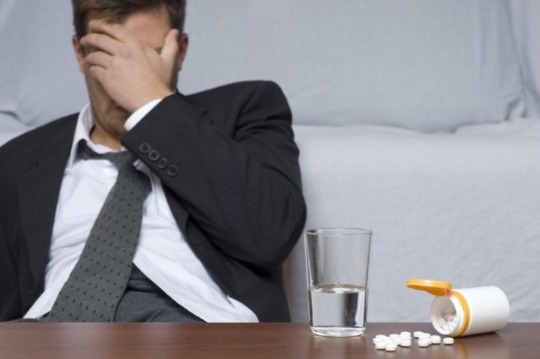
On the off chance that you have require a best reasonable Texas Divorce Law encounter, Drug and Alcohol Abuse in Texas Divorces with the immense procedure!
Family Lawyers in Houston: If you are in a marriage where your spouse is dealing with an alcohol or drug addiction you know how difficult it is can be on a family. There are ups and downs associated with your spouse’s mood. There are medical issues that come with the effects of abusing substances that the human body does not want to ingest.
There is also the emotional harm done to your children and other family members- including you. Deciding how to approach a situation like this requires a great deal of thought and consideration, and even after doing so it is sometimes hard to feel completely comfortable with the decision that you make.
Many people after considering their options and attempting to work with the spouse to attend therapy or counseling decide to end their marriage and file for divorce. Even if you believe that divorce is the correct path to take (and it may well be) it is not necessarily the case that involving a child custody dispute within the divorce is what is best for your children.
The divorce attorneys with the Law Office of Bryan Fagan, PLLC would like to offer our thoughts on the subject in order to share our perspective on how substance abuse, divorce, and fighting over the kids is hard combination to manage.
How you feel vs. How you should act
Family Law Attorneys Houston: It is completely understandable to feel upset, disgusted and downright angry at your spouse if he or she has shown an inability or unwillingness to deal with a drug or alcohol addiction. I will point out that not all people who abuse drugs or alcohol have the ability to control their behavior due to physiological and psychological factors that go beyond the “choice” to consume these substances.
Aside from that, all people have an ability to make positive decisions for themselves or to at least respect the attempts of loved ones to intervene on their behalves if they are unable to care for themselves.
Your initial instinct in a situation such as this may be to file for divorce the first chance you get and to engage in a contentious custody dispute with your abuser-spouse. In certain circumstances (especially where physical violence has occurred) this reaction may be justified.
However, I would argue that in the majority of divorces where one spouse is a drug or alcohol abuser this mode of thought probably is not the best way to proceed.
Fighting over the kids can ultimately hurt the kids
Houston Family Law Lawyers: What clients will sometimes lose sight of in the midst of a contentious and emotionally draining divorce is that their actions can have long ranging and serious impact on their children. It is not only the physical safety or your children that you will need to be concerned about in the context of a spouse who is a substance abuser, but also their emotional wellbeing.
A child in this situation has most likely been neglected by the substance abusive parent and needs certainty and stability more than ever at the outset of a divorce. Your child is already losing whatever normalcy existed in their life.
Attempting to further disrupt that equilibrium by severely limiting their other parent’s contact with them through a costly and nasty legal fight can contribute to feelings of unease and anxiety.
Children want to feel like they are being taken care of and are free to have relationships with both of their parents. Custody disputes that turn into legal battles can take time, attention and resources away from the child of your marriage.
Letting a Court have the final say on child custody can be a potential disaster
Family Law Lawyer Houston: The divorce process in Texas allows the parties to a case many opportunities to settle their disputes outside of the courtroom. Whether this is through direct negotiation with one another, attorney based negotiation or formal mediation are the main methods utilized during a divorce.
Most divorces in Texas never see the inside of a courtroom because out of court settlements are the norm rather than the exception.
The reason this is the case is that by negotiating with one another on the unique issues that their family faces, you and your spouse are able to determine tailor made outcomes for your divorce case. This obviously can have a long ranging impact on all aspects to the divorce, especially the agreements that can be reached regarding custody and visitation of your child.
You and your spouse know much better than a judge the specific issues that need addressing and how best to address them. A judge has the best of intentions when creating an order but has a limited amount of knowledge regarding your family and its dynamics.
Furthermore, a courtroom battle can create further animosity between your spouse and yourself. When your spouse has his or her own addictions to be concerned with, this is another potential point of conflict that can be avoided if handled correctly.
How to support your spouse even after a divorce
Kingwood Divorce Attorney: I know the first reaction you may have to reading the title of this section would be to roll your eyes or chuckle to yourself. Why would I want to support my spouse after we’re divorced? I mean- we’re not even spouses at that point.
While that is a true statement, you and your soon to be ex-spouse are still parents of the same child. Even if you find yourself taking care of the child on a day to day basis much more often that your spouse, it is important to communicate with your spouse as frequently as you are willing to do so and to encourage the strengthening of the relationship between your child and their other parent.
The parent-child relationship is not a zero-sum game. Just because the relationship between your child and their other parent gets stronger does not mean that your own parent-child relationship will suffer or diminish as a result.
What’s more- continuous and frequent contact between your child and your ex-spouse may be just the sort of motivation he or she needs to continue down a path towards sobriety.
The Law Office of Bryan Fagan, PLLC can help you during your divorce
The Woodlands Divorce Attorney: Legal representation is critical during a divorce and this is especially true during a divorce involving children and a substance abusing spouse. The attorneys with the Law Office of Bryan Fagan, PLLC not only are knowledgeable of the law that affects
Texas divorces but are sympathetic and effective advocates for families. If you are interested in learning more about our office please do not hesitate to contact us today ... Continue Reading
#divorce#family#Family Law#fagan#bryan fagan#attorney#attorneys#texas attorneys#law#lawyer#lawyers#Houston lawyers#Texas
7 notes
·
View notes
Text
Battle shout definitions Preface
Here it is. massive post combining thought that happened as the battle shout fully emerged as my brand of all disciplines. Fragment - battle shout chapter - Combined story telling segments (Curated from the different WIP posts) EDIT NOTES - these are fragments from my social pages where I am in the battle shout and adventure basics thought. It’s incomplete as it only goes back to a gengar picture in my feed. There is more I still need to add. — Newer to older (will create a 2nd one that is in a final decided order for a reader, may jump between different moments in the time line, kept to a minimum for helping comprehension ——— Whoever offers human growth / wellness at either no cost or a much lower cost than previously widely available is winning in capitalism. I hope to invent the No Cost solution, following the footsteps of tech brands and passionate innovators of our time. Games and medicines altering my state of mind provided me a space within which to BECOME me. They offered me the lesson of re sociating, once I started practice a desire to learn it. Here are some of the problems I inhabited and the solutions I learned after using medicines - ---calorie /nutrition deprivation : solution - making eating easier with hacks like prep, (paper dishes/cutlery), getting timing right, the decision to Breakfast and eat it slowly - replacements like the Soylent drink - medicines that fix appetite IE cbd ----hypervigilance - maybe haven’t fully escaped this one yet. It’s an ongoing conflict - using Medicines that reduce my physical anxiety cortisol which comes through as wheezing escalation attacks and very bad sleep - sleeping correctly makes me feel calmer, breathe/think clearly Medicine examples - coffee, reishi mushroom, cannabinoids, magnesium, L theanine, Lemon balm, Sleep specific - L tryptophan, Zinc, valerian root, doxylamine (unisom) -----Escapism - learning how to use mindfulness and writing to transform my self avoiding into Self Actualization ------Counterdependence - Realizing that sharing/affection and giving affirmation would make me feel good, letting me treat ppl like I deserved their attention (as a provider) not gonna stand by saying nothing while they try to trash gaming and say we are giving kids screen / media addictions, when the only things I even really know I learned from gaming, mostly online blizzard and/or adventure gaming. I’m gonna teach what I learned. It’s battle shout. how we are failing worst as a so called civilized population: Educating the youngest. We are not doing it. We are not prioritizing growth and wellness for the children here. We are breaking their families, parents and guardians instead of supporting. Dehumanism is institution. *witnessing your smiling face is the deepest privilege I will experience in living* We are not gonna save anyone until we recognize that growth is about including everyone, recognizing their individual passions and curiosity, recognizing that they themselves will be the only ones to decide how to be that self, Monetary Value will only every Destroy us all. EVERY one is struggling and i care about EVERYONE, humanity needs a bigger solution than a Lifeline reaction to the symptoms rather than the cause. {If you or someone you care about is struggling, please know you are not alone. The National Suicide Prevention Lifeline is available at 1-800-273-8255 in the U.S. or find support worldwide at https://www.befrienders.org/ } —schools where all gamers, creatives, learners are accepted so that human wellness growth can be placed above the falseness of Monetary Value -- available at nowhere because no innovator yet has cared with their entire life's mission to save those we currently discard. The school I'm trying to invent has a simple Main Value - School is Lunch. The target priority is non monetary. *Monetary Value will not measure our success* Human growth measures it. Human currency. what I would do with the elusive Lottery / Genie situation is create the Ultra Library whose only mission was to include as many human beings in growth wellness as possible, to offer them the place, resources, nutrition, and community safety to build the life they want to create IN essence I am trying to invent a school. I have a seething hatred for the failure of Public sector school, dealing with both neurodiversity concerns and non child centered curriculum design. Self educating is superior. Curation can only help existing curiosity and passion. my huge dream is to innovate the third place concept in fusion with educationalism, gaming cafe, the concept of Feeding every learner because it's more educational- the ultimate capitalism winner is the one whose Patrons flock simply because it is Better. =high contrast videos with songs of numbers, counting, vehicles/ramps, and piles of balls=The young children find these things very amusing. - the wise old teachers find the fact very important to distribute, although they themselves do not find it amusing they find the fact that the tiniest students are amused very important for distribution.== []2[] Operating vehicles or consuming alcohol are the most dangerous and pointlessly risky activities done by anyone (who doesn’t do employment that is specifically danger facing). Most are not qualified for these activities. It’s not safe, please leave it to the professionals few. Giving, the act of providing because I want to see human growth and learning. That’s my freedom to practice. Dehumanism makes it into a crime, after valuing it zero. Dehumanism Institution perpetuates the idea that giving, feeding, teaching, expressing can be penalized as crimes. These are the pillars of MY free speech. Giving, the act of providing because I want to see human growth and learning. That’s my freedom to practice. (Scott Warren who faces up to 20 years in prison for giving food & water to 2 men who needed help in the Arizona desert.) What I’m talkin about is this anti educationalism. Shocked ? That we aren’t already Veterans for standing rock +500K decent human beings SWARMING the sites where this has happened to tell them we won’t stand by as bystanders to Deadly Dehumanism. We are complicit in these deaths. I am not gonna be quiet about this, my brand is built upon radical educating, lifeguarding, human growth. That also means opposing bully bigotry. []3[] There is a bullying situation regarding the spectrum. Happening to one of my closest humans. It is making her suicidal (no one can handle endless mistreatment, then mental health slides) - I learned how to fight off the suicide ideas because I was in a kind of rock bottom near that for 10 years - ultimately, I defeated the boss, and I learned the strategy. learn to Tank at the front of it for the people I’m trying to educate, and keep them here on our Alive team. This is the real deal why I am the tank. The battle shout is to Shine the truth and save your life, you the most brutally dehumanized by the institutions of this economic-dystopia She has to be given the feeling she does have the power and the choice whether to stay here with us, alive. Educationalism is the desire to be surrounded by growth allies, and free from anyone who thinks a decision that reduces or infringes your growth and learning is either ok or even debatable with you Can we get Birth insurance ? I want it to function like life insurance, in the event you are born, the insurance policy covers some assurances. Wait, no, that’s not an insurance plan, that’s what School is meant to be I’ll be over hear spamming battle shout and taunt if you come at me debating seriously over contexts whose choices are outcomes that don’t abuse and compromise a child’s school environment, or hurting the child’s emotional and basic wellbeing. My Aggro will not be exceeded! Let us consult YouTube, young one. Where’s the one about the baby Shark? I will find it for u most easily. If u ever get mad at someone u got road rage or someone is gank camping. Just tell them Yo dude please go hug urself! The time has come To Learn Bout Eating breakfast! If u don’t eat it, ur brain won’t think right, ya Dingus!! Wake up and eat this health, that’s your grade. Welcome to school. Favorite offline activities - social prompt - Activities that take place on beds, furniture or desk. Followed by wandering whether by land, air, or foot. Followed by culinary making. I identify toward the feeling that being burly means being kind - a defender, a watcher, a lifeguard. So it’s cool to see brands grounding themselves in this type of thought. burly man coffee promoted by a podcast i watch Brands that literally hold up kindness and human growth as a piece of their identity are the brands with sanity to shine light in the darkness of economic institutional dehumanization No game except maybe the sims had a soap item, demonstrated a buff benefit for soap. Soap knowledge is something that legitimately is part of human excellence - mind efficiency - educationalism ^^highlight$$ What I am concepting is the fact that valuable education is about human cognitive expansion, making this brain run the way its optimized to run, repetition, medicines/enhancers, the basic sensory reboots. Thinking better, clearer, bigger, quicker, learning ABOUT thinking. {schools get blamed for inability to solve the inequality economics} Entirety of the problem: the loss of investment into human growth and wellbeing. Capitalism forgot human currency value, then got surprised when everything turns shit? School IS lunch. We don’t need schools/tests/graduation. Kids will unschool just fine for the rest, if they are fed, safe, and able to have rest and resources and tech so they can iterate Failure during Curiosity. We need to care about human wellbeing, within our economics. Parents can and will educate. Most of the educating that needs to happen can only really be done by them. Gaming zen works for human growth bolstering because it follows the pattern our brains already know - repetition, the core block of neuroplasticity. This the overarching purpose of my Adventure Basics educational learning plan. As a creative first it’s my quest to harness games, adaptogens, and shamanism/lucidity/psychadelics to find transcendence. We can pair ego repletion with deeper Re-ssociation as an ultimate healing / neurogenesis. This will allow us to grasp mental wellness and human creative excellence. ** [intent statement as disciplines] From the multi disciplinarian standpoint- •Nintendo console 8 - 64 bit thought •Logic puzzles / riddles •classic adventure / role playing •classic FPS •classic dungeon crawl •Modern Adventure (games less about puzzle solving and more about finding all paths in a very large and breathtaking expanse) •Attention + Sensory rich interactive experiences •Primal Rage - the use of violence and intensity in musical and gameplay aesthetics •Cave human Dominance and roles thought deriving from gameplay, aspects of being Front edge protector of the tiniest most important Clan members •Economics Core freedom ideal - the belief that all interaction must be voluntary and the belief in a Best unity of gathered Wills ||||||Final crusade - educating to be correctly seen as: self evident truth about human growth, spanning nutrition, medicines, tools/games/challenges and driven by self voluntary []4[] School is Breakfast Lunch and Dinner plus freedom to explore one’s own sparks to ideas This is what I am teaching with my Wow Classic Adventure Basics educational Learning plans! ~~ One of my most important lessons about video game wellness is a thought from Mike @MikeLICSW Langois, that taking command of a powerful or attractive identity gives us strong boosts of mental ability and cognitive balance ultimately, for small attention cost. Ego repletion. It’s proven fact generosity makes u happier person. Why is this - the act of giving sparks gratitude to come forth. Gratitude literally saves, while angry kills u. This is the difference between troll griefing and community support
0 notes
Text
The mind, my mind, should be no home for apprehension 7-28-19
"I've been giving a good deal of thought to this entity in my head, about its nature. Also, its composition." - Vision from the Avengers
Me too. Me too. Maybe even an unhealthy amount of thought. Although I find life easier and more manageable because I write about so much of it, and I suppose I tend to over-analyze issues, feelings, and/or thought patterns way more than the "normals". That's ok though. That's just the way my story goes.
So its Saturday night around 9:30 pm and I have been home for about an hour and a half, maybe two. Its been an incredibly long work week, enough so I didn't get much Door Dashing in.
I don't really know where to start, or exactly how to say this next part, but I need to and I am extremely limited, especially in the approach, which further complicates the how, so. . .
Something very bad happened to one of my older kids last night or early today, whatever. He was attacked. That is absolutely all I get to say about that. Because this truth is shared, and for his wellbeing, and his emotional status, as it were, it's not open to the public right now, nor will that ever be my call. He is safe at home with us right now, and hopefully, this prevents further "misdoings" on his part later, but for now, he is well.
All my notes, and quotes, from this week, all in unedited form, will be posted below. It would have been a pretty good entry if I would have filtered it through, but more pressing things have obviously transpired that are far more important.
I was seriously tore up over it, and the helplessness of it all. All the emotions from sadness, anger/rage, and guilt has washed over me and off the other side. Limiting myself on how and what I say to him so that he hears "I love you", and not "I told you so" shit is pretty important.
I want more than anything to go out and be as unkind as humanly possible to some, deserving . . . .Predators disgust me. They are truly cowards, preying on the weak as they do.
Standing up to bullies, big or small, and constantly siding with the weak and/or innocent will always take a front seat to being kind to everyone, always. As my mission for kindness and civility are still very important to me, and, I hope, to the rest of the world, people who take away feelings of safety, security, and contentment from those who aren't as strong, or as fortunate or any other number of things that make evil people think they are better, will be a fight that everyone knows which side I'm on forever, and I'll stand on the front lines. Stand right next to any of them, against any of those pussy, ass, cowards, who couldn't publicly stand their ground if they wanted to. Let it ever happen in front of me and we'll see just how quickly I can find the justification and/or rationalization to bring so much physical unkindness with me they'll only wish they were dead.
I think I am getting a little sidetracked.
Look, he is, as ok as he can be I suppose. I am too. One thing at a time. It does put a twist on priorities, and on perspectives for me again, as I realize how much worse things could be. Even with one of the other kids in jail, where he's been for a few weeks now, this just proves how bad things can happen in an instant.
Make good choices people. If not for your own well being, then do it for your loved ones' peace of mind. I am going to leave that at that. Might be more later, or in future entries, and there might not be either. At this point, it's hard to tell. I will not be playing Q and A with anyone wanting specifics in the comments either, so please don't ask. It's not my place, and if and when he's ready he can, or allow me to, etc. If you are close enough to our family, then I'm sure you can find out who, and direct any concern you have in his direction. For now, his comfort is far more important than your curiosity.
As promised, my "selfless vs selfish" unedited, and not quite finished entry, will be pasted right below here.
-{ "Often when you think you're at the end of something, you're at the beginning of something else." - Fred Rogers
Selfish or selfless? I'd say pick a side. But that's really pretty impossible.
Selfishness, which I've been talking about a little more lately, is very much a part of the human condition. At its very core, it's a human trait or characteristic. Its one that has to be trained out of us, to whatever degree we feel necessary or comfortable which defines us I suppose. From a very early age, our parents generally have to make us share with others. It's from this point in life that selflessness training begins.
In my opinion, it shouldn't stop as adults, but rather we should become our own trainers, with the lessons being, not so difficult as they were as children. We have to allow that though.
If every time something, anything really, happens in our lives. . . if our first instinct is "Me", how does it affect me, how does it make feel, etc, well then, my point is I still have some "self" to work on.
I also understand, to a degree, that keeping your selfishness confined around the people in your immediate and small circle can feel like being selfless, but I assure you that's only a starting point, if you're looking for deeper purpose, or redefined meaning. Selflessness in itself is the reward you didn't know you were looking for.
The benefits of selfishness are inconsequential compared to the lasting rewards of selflessness. And I get that being selfish when it comes to your circle or a group of people can sometimes be necessary, even vital, but selfishness is intertwined with helping others or looking out for others, so it doesn't really qualify as self anyway. Now does it? it is "self" serves you, "selves" serves others as well as you. Absolutely not the same thing.
None of this means that others weren't or aren't showing their selfishness, but I need to realize that it's more about the universe pointing out to me that I'm not or wasn't being as selfless as I thought I was I guess.
I wish I was already at a point where balancing ego was second nature. Although my writing does seem to help with that more than if I didn't. I guess at the same time though, being grateful for the journey and all of its parts and struggles, I know, is essential for the human condition, my human condition, to evolve.
It's more like find a balance that tilts heavily towards selfless and readjusts constantly, edging closer and closer to full selflessness.
The only thing we really have any control over, anyway, is moving forward.
By knowing that I have at least one reader every week, it helps me to write more openly, and way more completely than if I was just to keep a private journal.
It doesn't even matter how many read, or how often, or if they are regular readers, which I imagine most are, it still helps my resolve. Plus, like the last few entries to this one have proved, I get to relearn things, and learn new lessons at the same time because I can instantly recall what I just wrote as I contemplate what to write the next week through the course of the week and which direction to take it, sometimes in comparison because I'm almost always, currently living it.
And you don't really even have a responsibility to me as said readers, not as individuals anyways. As a collective, no matter how small, you help me to stay open and honest just by existing and occasionally reading.
It shouldn't have to be you guys who continually save me, but nonetheless, it is by reading that you do. So thank you for that. (Place right before remember to share the love and the laughter with the world)
"I'm in the lion's cave, I've done it all before
I feel alive again, But maybe not for long
Another day will come, Full of light and desire
Is your life okay?, Is it who you are?
Are you right on track, Or has it gone too far?" - Last Day Under the Sun by Volbeat
Thank you, because you are the ones who indirectly hold me accountable for all the good and positive things that I say I have in my life. By doing so, I stay continually in gratitude and it makes it harder to lose sight of that with you guys on the other side of these entries.
For the end;
Why I write regardless of what anyone may say, think, or feel about my truths;
"People have said, 'Don't cry' to other people for years and years, and all it has ever meant is, 'I'm too uncomfortable when you show your feelings." - Fred Rogers
0 notes
Text
What Are Active-Shooter Drills Doing to Kids?
There’s always at least one kid in tears, as they huddle under their desks in the dark. Still Beth Manias, an early-elementary literacy teacher outside of Seattle, tries to act upbeat and relaxed.
“I have them whisper about their favorite candy, dinner, books, movies—whatever, as a distraction,” Manias told me. She tells the kids they’re practicing to stay safe in case there’s ever a bear on campus. Though, she admits, “They always see through this. The older they get, the more savvy they become, probably because they are exposed to more of the news.”
At schools across the country, more children are taking part in mandatory “active-shooter drills.” Forgoing any pretense of a bear, sometimes a faculty member plays the role of a shooter, jiggling doorknobs as children practice keeping perfectly silent. Many parents, teachers, and students say that the experience is somewhere between upsetting and traumatizing.
Which may be worthwhile, if it were clear that the drills saved lives.
Active-shooter drills came into existence after the Columbine massacre in 1999. What is known of their long-term psychological effects comes from the reports of people now in early adulthood.
Ryan Marino, an emergency-medicine physician at the University of Pittsburgh, recalled that his school had adopted the drills during that period, after a student was found to have a “death list” and access to guns. He told me the drills didn’t seem real until he was 12, and a fellow student coughed during one of the drills. “The teacher told us that if this had been real, we would all be dead.”
“That single experience shaped my childhood,” Marino said. “Having to practice and prepare for a peer coming to my school and shooting at me and my friends was something that really changed the overall atmosphere. Looking back, it was a major shift in how the world felt.”
In the two weeks since the shooting at a high school in Parkland, Florida, new and renewed calls for such drills raise the question of whether they do any good—and if they might be doing harm.
The day after the event, Susan Hennessey, the executive editor of Lawfare, tweeted: “Feeling mildly nauseous reading a note from my kid’s preschool about implementing active-shooter drills.”
Brian Leff, a writer in Los Angeles, told me his fifth-grade daughter’s principal just announced the school is contemplating a surprise lockdown drill. “Now my daughter can’t stop thinking about when it’s going to happen and how she’ll know if it’s ‘real’ or not.”
The writer Allison Gibson says that at her 4-year-old son’s preschool, they’re called “self-control drills,” because the goal is to get the students very quiet. “The first time he mentioned it, when he was 2, I had to piece together what he was referring to, and it nearly broke me.”
Of course, general lockdown and disaster drills have a long history; a generation of Americans came of age hiding under desks from nuclear bombs. While the idea of such a maneuver protecting a person from a bomb blast or nuclear fallout became fodder for jokes, the drills themselves had insidious effects on kids’ senses of safety. Some teachers reported that students’ artwork changed to feature mushroom clouds and sometimes the child’s own death, bringing a pervasive sense of danger into the places where kids most need to feel safe.
Despite some similarities to natural-disaster and Cold War drills, active-shooter drills also mean exposing kids to the idea that at any point, someone they know may try to kill them.
“It’s good to do emergency drills, but active shooters are not a drill anyone should have to do,” says Meredith Corley, who taught math in Colorado in the aftermath of Columbine. “It re-traumatizes kids who have experienced violence. Getting the kids settled back into the work of learning after lockdown drills is a nightmare. That mind-set has no place in a learning environment.”
“I was slightly too young for bomb drills, but in greater Kansas City, tornado drills were de rigueur,” says Lily Alice, a Midwesterner born in 1965. “We did have tornados now and then. The difference, of course, is that no one stockpiles them to use against other people, and weather forecasts mitigated some fear.”
Even President Trump, who has expressed support for arming teachers, has warned against active-shooter drills. During a White House meeting last week, he said, “If I’m a child and I’m 10 years old, and they say we’re going to have an active-shooter drill, I say, ‘What’s that?’ ‘Well, people may come in and shoot you’—I think that’s a very negative thing ... to be honest. I don’t like it.”
Zachary Levinsky, a lecturer in the department of sociology at the University of Toronto at Mississauga, is one of few academics who has studied active-shooter drills. He argues that though some school violence always existed, Columbine marked a shift of the burden of prevention: “Schools were somehow positioned as blamable—as responsible for these massacres.” This created an institutional concern for reputational risk management. To implement something like an active-shooter drill was to signal to parents and the community that the school is being proactive—it was doing something.
Of course, a demand for action does not often make for prudent decisions when it comes to harm reduction. Drills cover administrator and school-district liability, and they may make parents feel better knowing that their kids are in a school that’s taking decisive action. But what are the longer-term effects on the children’s health and development?
Studies of whether active-shooter drills actually prevent harm are all but impossible. Case studies are difficult to parse. In Parkland, for example, the site of the recent shooting, Marjory Stoneman Douglas High School, had an active-shooter drill just last month. The shooter had been through such drills. Purposely countering them may have been a reason that, as he was beginning his rampage, the shooter pulled a fire alarm.
In any case, preparedness drills always change the baseline level of risk that people perceive. This heightening can manifest as stress and anxiety, not to mention changing the way kids understand how people treat one another—to even consider violence an option, not in some abstract way.
Colleen Derkatch, an associate professor at Ryerson University in Toronto, studies how we assess risk when it comes to our health. “The more prepared we are, the more heightened our sense of risk,” she told me. “And one potential effect we haven’t considered is how these kinds of preparedness activities affect kids psychologically, and could increase a sense of feeling at risk. They really expand the ways in which we feel increasingly under siege.”
Preparedness activities, that is, are never neutral. Derkatch’s work relates this concept to the anxiety wrought by a culture of “wellness” products, which are ostensibly meant to keep us healthy, but also enhance our awareness of health risks. “They give us a sense that we’re all constantly on the edge of illness,” Derkatch told me. “Preparedness can be a good thing, but it has very real costs and consequences. For children whose personalities are just forming—who are figuring out what kind of world they live in—if this is the input they get, I think it will have a significant impact down the road.”
The idea extends to the fact that a child is much more likely to be abused by a parent than shot in school; but there would be obvious limits to the value of putting kids through realistic simulations in which a parent turns on them.
Derkatch has an 11-year-old daughter who is in the sixth grade. In her school, they’ve done lockdown drills, but the drills are the sort that are generalizable to any emergency. The teachers are very clear that it’s just a drill, and they lock the doors, and kids stay in their seats. There’s no hiding or barricading, as many schools in the United States now require.
If you were to move to the United States, I asked Derkatch, would you want your daughter going through these sorts of drills?
“No,” she said. “But I wouldn’t move to the United States. And guns are the reason why. Guns and health care.”
The two are, of course, now intertwined. President Trump and many other Republicans have a penchant for blaming “mental illness” for mass shootings—even though most shooters have no known or diagnosable mental illness. People who are mentally ill are much more likely to be victims than murderers. Most are rather, like the shooter in Parkland, described as isolated, troubled, angry, resentful men and boys. Many have a history of childhood trauma, like being abused or neglected. It is rare that a shooter has come up in an environment with multiple adults on whom they could rely—where they felt safe and secure.
A sense of safety and security in childhood is integrally tied to mental and physical health later in life—as well as emotional wellbeing, and the formation of the coping mechanisms that allow a person to deal with later adversity in ways that do not involve killing. It is this sense that can be undermined sometimes even by the best of intentions.
“Kids perceive the world generally as a bit of a dangerous place now because of how they tend to be closely supervised at almost all times,” said Derkatch. “If you look at the proposals in the United States, it sounds like they’re trying to make schools an awful lot like prisons, with monitored perimeters and armed guards and possibly armed teachers. You could extrapolate from the experiences of kids living in potentially violent situations, where you never know what’s going to happen. That does have a profound impact on kids.”
“I will never be able to explain it well, but losing a feeling of safety as a child, especially at school, is a major thing,” said Marino, the emergency physician who was terrified to cough. “Anyone who has not gone through school with active-shooter drills can never understand what it feels like.”
from Health News And Updates https://www.theatlantic.com/health/archive/2018/02/effects-of-active-shooter/554150/?utm_source=feed
0 notes
Text
What Are Active-Shooter Drills Doing to Kids?
There’s always at least one kid in tears, as they huddle under their desks in the dark. Still Beth Manias, an early-elementary literacy teacher outside of Seattle, tries to act upbeat and relaxed.
“I have them whisper about their favorite candy, dinner, books, movies—whatever, as a distraction,” Manias told me. She tells the kids they’re practicing to stay safe in case there’s ever a bear on campus. Though, she admits, “They always see through this. The older they get, the more savvy they become, probably because they are exposed to more of the news.”
At schools across the country, more children are taking part in mandatory “active-shooter drills.” Forgoing any pretense of a bear, sometimes a faculty member plays the role of a shooter, jiggling doorknobs as children practice keeping perfectly silent. Many parents, teachers, and students say that the experience is somewhere between upsetting and traumatizing.
Which may be worthwhile, if it were clear that the drills saved lives.
Active-shooter drills came into existence after the Columbine massacre in 1999. What is known of their long-term psychological effects comes from the reports of people now in early adulthood.
Ryan Marino, an emergency-medicine physician at the University of Pittsburgh, recalled that his school had adopted the drills during that period, after a student was found to have a “death list” and access to guns. He told me the drills didn’t seem real until he was 12, and a fellow student coughed during one of the drills. “The teacher told us that if this had been real, we would all be dead.”
“That single experience shaped my childhood,” Marino said. “Having to practice and prepare for a peer coming to my school and shooting at me and my friends was something that really changed the overall atmosphere. Looking back, it was a major shift in how the world felt.”
In the two weeks since the shooting at a high school in Parkland, Florida, new and renewed calls for such drills raise the question of whether they do any good—and if they might be doing harm.
The day after the event, Susan Hennessey, the executive editor of Lawfare, tweeted: “Feeling mildly nauseous reading a note from my kid’s preschool about implementing active-shooter drills.”
Brian Leff, a writer in Los Angeles, told me his fifth-grade daughter’s principal just announced the school is contemplating a surprise lockdown drill. “Now my daughter can’t stop thinking about when it’s going to happen and how she’ll know if it’s ‘real’ or not.”
The writer Allison Gibson says that at her 4-year-old son’s preschool, they’re called “self-control drills,” because the goal is to get the students very quiet. “The first time he mentioned it, when he was 2, I had to piece together what he was referring to, and it nearly broke me.”
Of course, general lockdown and disaster drills have a long history; a generation of Americans came of age hiding under desks from nuclear bombs. While the idea of such a maneuver protecting a person from a bomb blast or nuclear fallout became fodder for jokes, the drills themselves had insidious effects on kids’ senses of safety. Some teachers reported that students’ artwork changed to feature mushroom clouds and sometimes the child’s own death, bringing a pervasive sense of danger into the places where kids most need to feel safe.
Despite some similarities to natural-disaster and Cold War drills, active-shooter drills also mean exposing kids to the idea that at any point, someone they know may try to kill them.
“It’s good to do emergency drills, but active shooters are not a drill anyone should have to do,” says Meredith Corley, who taught math in Colorado in the aftermath of Columbine. “It re-traumatizes kids who have experienced violence. Getting the kids settled back into the work of learning after lockdown drills is a nightmare. That mind-set has no place in a learning environment.”
“I was slightly too young for bomb drills, but in greater Kansas City, tornado drills were de rigueur,” says Lily Alice, a Midwesterner born in 1965. “We did have tornados now and then. The difference, of course, is that no one stockpiles them to use against other people, and weather forecasts mitigated some fear.”
Even President Trump, who has expressed support for arming teachers, has warned against active-shooter drills. During a White House meeting last week, he said, “If I’m a child and I’m 10 years old, and they say we’re going to have an active-shooter drill, I say, ‘What’s that?’ ‘Well, people may come in and shoot you’—I think that’s a very negative thing ... to be honest. I don’t like it.”
Zachary Levinsky, a lecturer in the department of sociology at the University of Toronto at Mississauga, is one of few academics who has studied active-shooter drills. He argues that though some school violence always existed, Columbine marked a shift of the burden of prevention: “Schools were somehow positioned as blamable—as responsible for these massacres.” This created an institutional concern for reputational risk management. To implement something like an active-shooter drill was to signal to parents and the community that the school is being proactive—it was doing something.
Of course, a demand for action does not often make for prudent decisions when it comes to harm reduction. Drills cover administrator and school-district liability, and they may make parents feel better knowing that their kids are in a school that’s taking decisive action. But what are the longer-term effects on the children’s health and development?
Studies of whether active-shooter drills actually prevent harm are all but impossible. Case studies are difficult to parse. In Parkland, for example, the site of the recent shooting, Marjory Stoneman Douglas High School, had an active-shooter drill just last month. The shooter had been through such drills. Purposely countering them may have been a reason that, as he was beginning his rampage, the shooter pulled a fire alarm.
In any case, preparedness drills always change the baseline level of risk that people perceive. This heightening can manifest as stress and anxiety, not to mention changing the way kids understand how people treat one another—to even consider violence an option, not in some abstract way.
Colleen Derkatch, an associate professor at Ryerson University in Toronto, studies how we assess risk when it comes to our health. “The more prepared we are, the more heightened our sense of risk,” she told me. “And one potential effect we haven’t considered is how these kinds of preparedness activities affect kids psychologically, and could increase a sense of feeling at risk. They really expand the ways in which we feel increasingly under siege.”
Preparedness activities, that is, are never neutral. Derkatch’s work relates this concept to the anxiety wrought by a culture of “wellness” products, which are ostensibly meant to keep us healthy, but also enhance our awareness of health risks. “They give us a sense that we’re all constantly on the edge of illness,” Derkatch told me. “Preparedness can be a good thing, but it has very real costs and consequences. For children whose personalities are just forming—who are figuring out what kind of world they live in—if this is the input they get, I think it will have a significant impact down the road.”
The idea extends to the fact that a child is much more likely to be abused by a parent than shot in school; but there would be obvious limits to the value of putting kids through realistic simulations in which a parent turns on them.
Derkatch has an 11-year-old daughter who is in the sixth grade. In her school, they’ve done lockdown drills, but the drills are the sort that are generalizable to any emergency. The teachers are very clear that it’s just a drill, and they lock the doors, and kids stay in their seats. There’s no hiding or barricading, as many schools in the United States now require.
If you were to move to the United States, I asked Derkatch, would you want your daughter going through these sorts of drills?
“No,” she said. “But I wouldn’t move to the United States. And guns are the reason why. Guns and health care.”
The two are, of course, now intertwined. President Trump and many other Republicans have a penchant for blaming “mental illness” for mass shootings—even though most shooters have no known or diagnosable mental illness. People who are mentally ill are much more likely to be victims than murderers. Most are rather, like the shooter in Parkland, described as isolated, troubled, angry, resentful men and boys. Many have a history of childhood trauma, like being abused or neglected. It is rare that a shooter has come up in an environment with multiple adults on whom they could rely—where they felt safe and secure.
A sense of safety and security in childhood is integrally tied to mental and physical health later in life—as well as emotional wellbeing, and the formation of the coping mechanisms that allow a person to deal with later adversity in ways that do not involve killing. It is this sense that can be undermined sometimes even by the best of intentions.
“Kids perceive the world generally as a bit of a dangerous place now because of how they tend to be closely supervised at almost all times,” said Derkatch. “If you look at the proposals in the United States, it sounds like they’re trying to make schools an awful lot like prisons, with monitored perimeters and armed guards and possibly armed teachers. You could extrapolate from the experiences of kids living in potentially violent situations, where you never know what’s going to happen. That does have a profound impact on kids.”
“I will never be able to explain it well, but losing a feeling of safety as a child, especially at school, is a major thing,” said Marino, the emergency physician who was terrified to cough. “Anyone who has not gone through school with active-shooter drills can never understand what it feels like.”
Article source here:The Atlantic
0 notes
Text
04 - just an emo story (lol not really, it’s kind of a funny story)
- How Mr. S and I started (and ended). -
I always knew he and I weren’t destined for each other. After all, it wasn’t like our first meeting had been not planned at all. I had been the mastermind behind it and, at that time, I was proud of myself.
Well, not necessarily proud…
Mr. S and I met when we were both seventeen during a ten-day trip we took with our class to celebrate that we were, finally, graduating from high school. We were young, reckless and lived on an everyday basis that consisted of partying, drinking and sleeping like bears for 10 hours straight. Now that I think about it, those were the golden days.
There was this other girl, we’re gonna call her Ms. C, who was deeply and completely obsessed with Mr. S. But really obsessed, up to the point she would follow him around the hotel we were staying, would cry for him while being drunk and would ask all of her friends to talk him into at least giving her a chance. And that’s where I come in.
Out of all the adjectives that exist out there, innocent would be the one that describes me best. If I’m innocent now, imagine how innocent I was at seventeen. I was on another whole level of innocence. And this led me to meeting Mr. S, ruining some kind of friendship (well, honestly, we were acquaintances) and almost ending up in a hospital. Girls, remember: if you’re gonna do it, it has to be at high levels.
Anyways, as I was saying, I was only seventeen years old, and I saw this girl crying desperately on a corner during a party on the second day of our trip. Of course I, always the very concerned about the wellbeing of every human being on earth, had to go and ask her what was wrong. And there she goes, she starts crying and ranting about how much she loved Mr. S, how he was perfect for her and how she was perfect for him, and also how badly she needed him (remember: she was hella drunk). So I offered her what would then become my personal living hell: I looked at her directly in the eyes (well, I was kinda drunk too, so I guess I was looking at her in the eyes) and with a deep drunken voice told her: ‘’I´m gonna help you. By the end of this trip, he’s gonna fall in love recklessly with you. You’ll see.’’
The following day found me with mixed emotions: on the first place, I had a raging hangover that felt like my brain was being constantly hammered against my skull, but if I stopped thinking about that for a second, I could feel the excitement of this new adventure building up on my body. And with that, also came the happiness of finally being able to help someone. And someone who was so sad that didn’t even care if all of her classmates saw her crying on the floor while her hair was a mess, her makeup made her look like a mad person and her clothes were completely dirty and destroyed because of the party’s wildness.
And so with this bright perspective and with a little bit of illusion, I started my journey into the heart of Mr. S.
Long story short: I failed.
Miserably.
Turns out that we shared our taste in music: we both liked (like) 80s music. And of course, that was more than enough for him to fall for me.
Not only was that a mistake (a huge one!), but everything went down when I started falling for him too.
As I listen to Kylie Minogue’s All the Lovers my brain fills with memories from our long chats near the river while listening to The Police, sharing beers at night and talking drunken nonsense while laying down on his room’s mattress. But no, it weren’t his looks what made me fall, nor his smile or his attitude. Not even his eyes (blue, by the way).
What made me fall for him (and hard) was the fact that out of all the days we shared not even once did we feel the need to get physical.
The atmosphere felt heavy, exciting, and sensual, the sexual tension building up just by slightly touching our hands, but just by looking at each other in the eyes and by talking, slowly and with content, we could already feel full.
It was magical.
But I’m gonna cut it short, so I don’t bore you with this nonsense (spoiler alert: we did not end up together).
I’ve had this thing, for a long time now, that makes me stop liking someone after we get too close to each other. Meaning, once I start developing deep feelings, once we get too close, I suddenly lose interest. When people get too close to me, it hurts.
Carol, my best friend ever, partner in crime and the only woman in this world in can firmly call my sister, had always told me I felt this way because I had never fallen in love. For real.
And that, after hours and hours of thinking, actually made quite sense. Was I really in love with Mr. S? Was it some kind of crush? Hadn’t it been the rush of the moment? Or even worse, would I have paid attention to him if I’d seen him on the street? Probably not.
Of course, all of this reasoning came waaay after everything went crazy. Like mental crazy.
This thing I’ve been telling you about got in the middle, and I suddenly realized he wasn’t really my type. And with that, came desperation, boredom and sadness. I felt depressed just by looking at his face, and every time I looked at him I could see Ms. C’s accusatory eyes, looking right into my soul. And just as fast this fling came it suddenly flew away, leaving me all alone again. Well, it wasn’t like he left me.
I did.
I slowly started drifting away, becoming distant, ignoring him, and not answering his calls. He could see the emptiness in my eyes, my soul getting colder as seconds went by. And suddenly, it was over.
But obviously, this didn’t happen without some drama in the middle, clearly. It all started when Ms. C found out about Mr. S and me.
It was high school, so you can imagine how fast rumors flew around. Now let me describe Ms. C a bit so that you can create an image in your mind.
Ms. C was about 1.76 cm tall (5’8), she was one of those chubby girls in high school that can clearly wrestle (she actually did compete in wrestling in our school’s contests). And then, there was me, poor little girl with 1.56 cm tall (5’1), not having the body of a wrestler and actually quite weak. So, you can already imagine my face (and my fear) when not-so-little Ms. C threw herself all over me and started hitting me, just because I had stolen her guy.
And the worst thing was that he wasn’t even worth it. Even so, we had already broken up. And even worse, I was going through that depressive phase in which all I could think about how asexual I was (not that that is a bad thing), how I was not attracted to anyone and how I would die alone.
Oh, and you wanna know when she tried to wrestle me? Well… it was during our graduation party and let me tell you, I was as drunk as I had ever been. So yeah, I was pretty weak.
Some parents that were present at the party (for safety, of course) had to separate us (separate her from me, actually) and assist me.
The truth is, I was lonely. Depressed. Sad. Heartbroken even. But the worse thing out there had been that Mr. S had seen everything, and he knew the reason behind Ms. C’s attack. And all he did was stare and just leave, after seeing me on the floor, blood on my lip, tears on my face. I didn’t even defend myself! How could I? Not only because I was weak, but also because I had destroyed myself. I had broken my own heart and let myself down. I was weak to fight back, to get away, and to defend myself.
I was too weak to save me from myself.
A-
#writer#writers#writers of tumblr#writers of the future#author#authors#author of tumblr#new author#new authors#new writers on tumblr#new writer#new blogspot#new blog#blog#blogging#personal#daily life#thoughts#storytime#love#romance#sad#depressed#loving boys#lovely#cute#beautiful#ex#girls#boys
0 notes